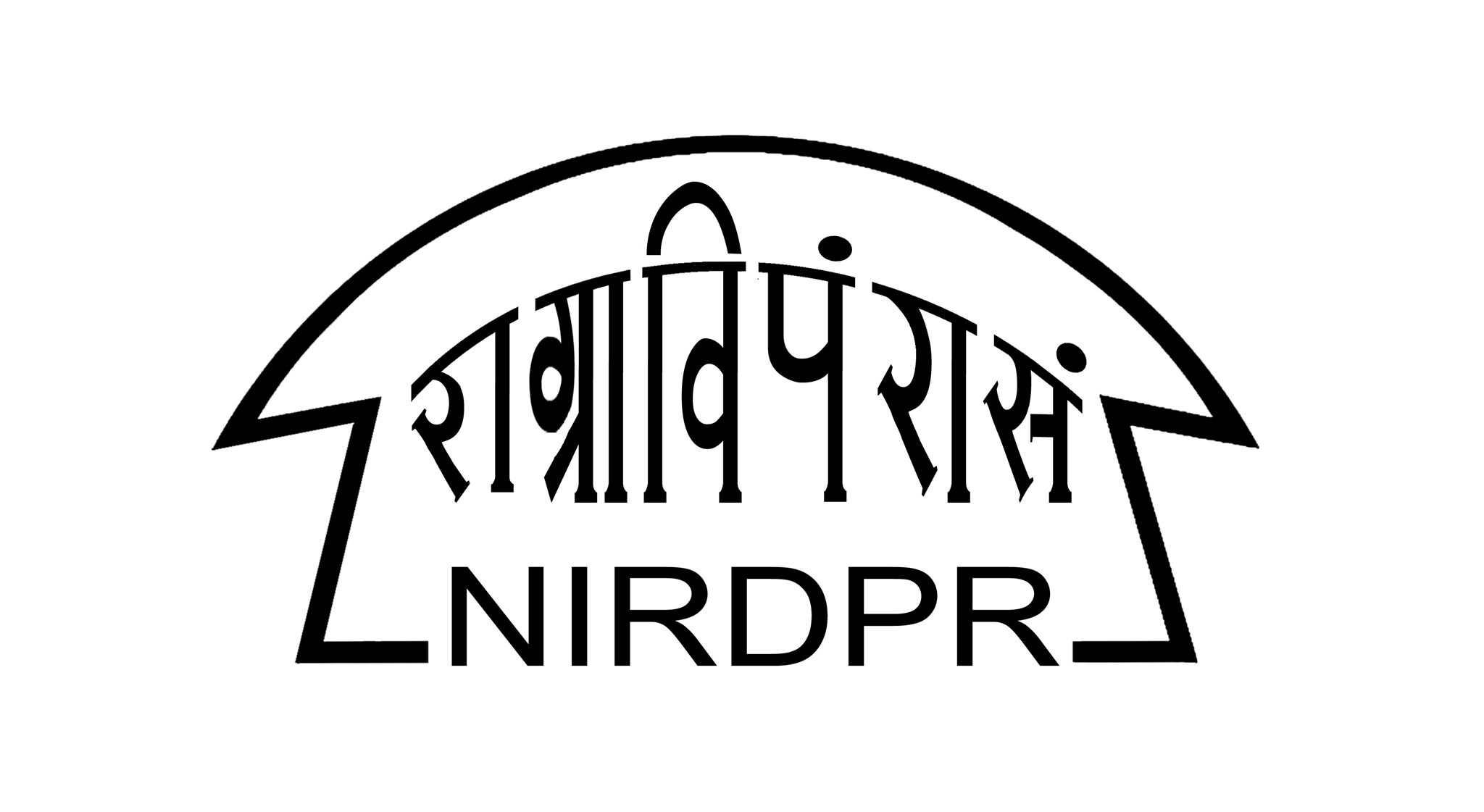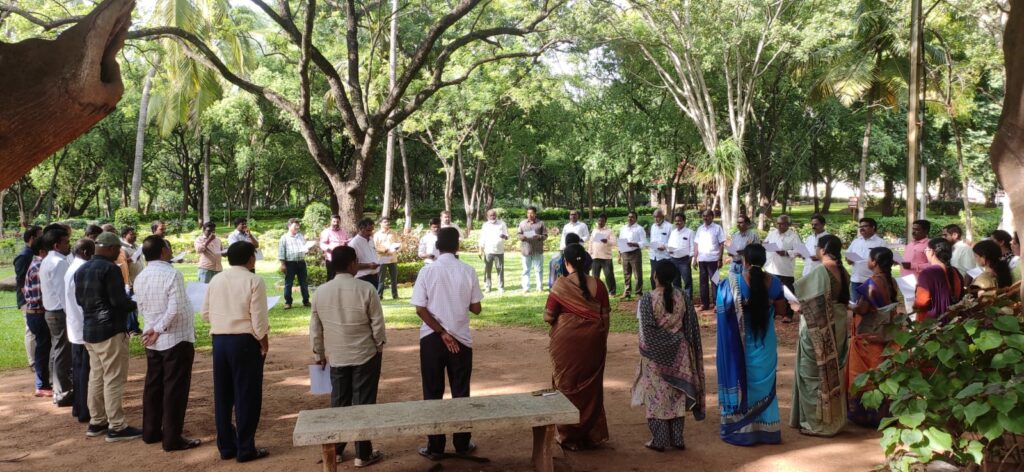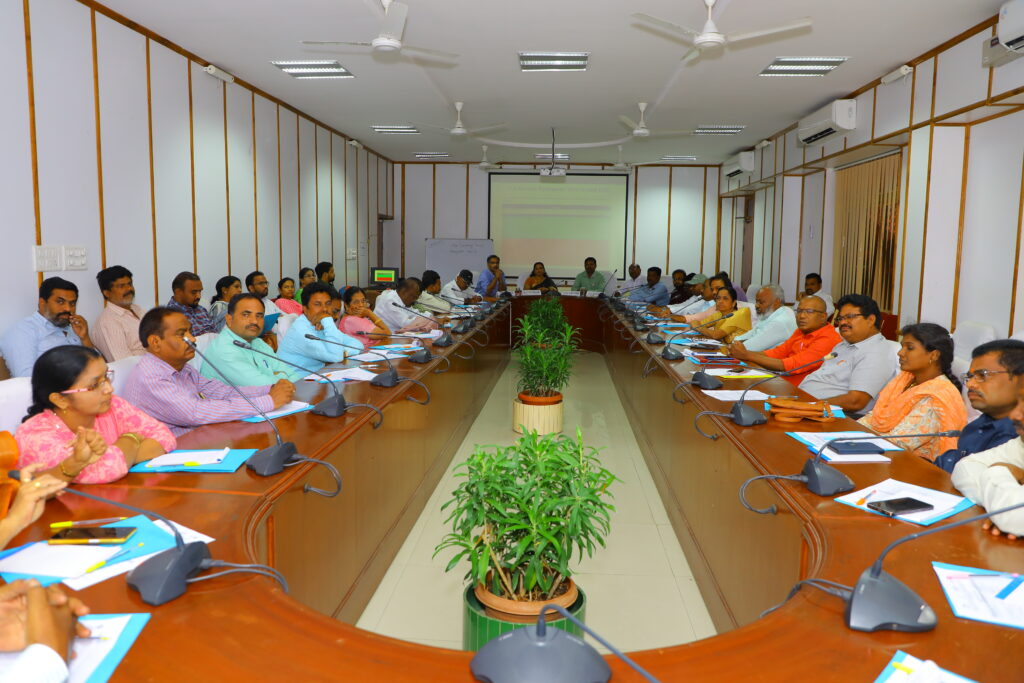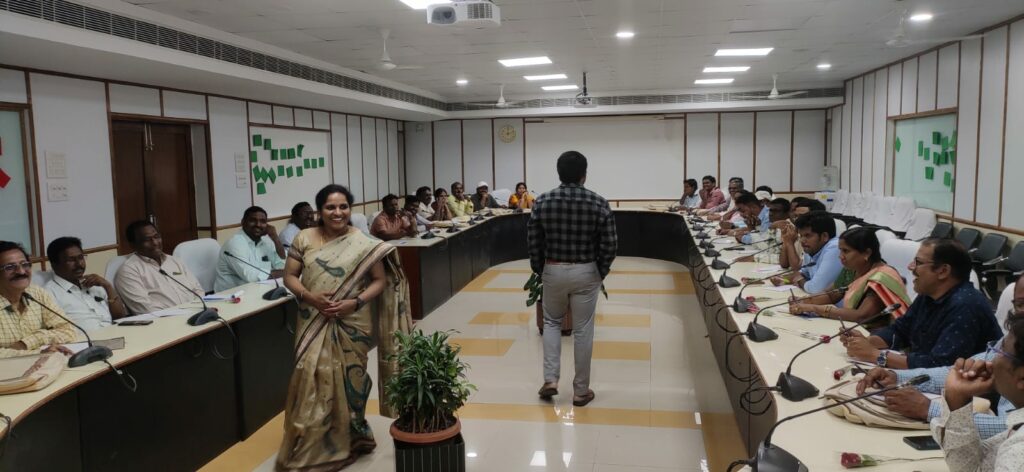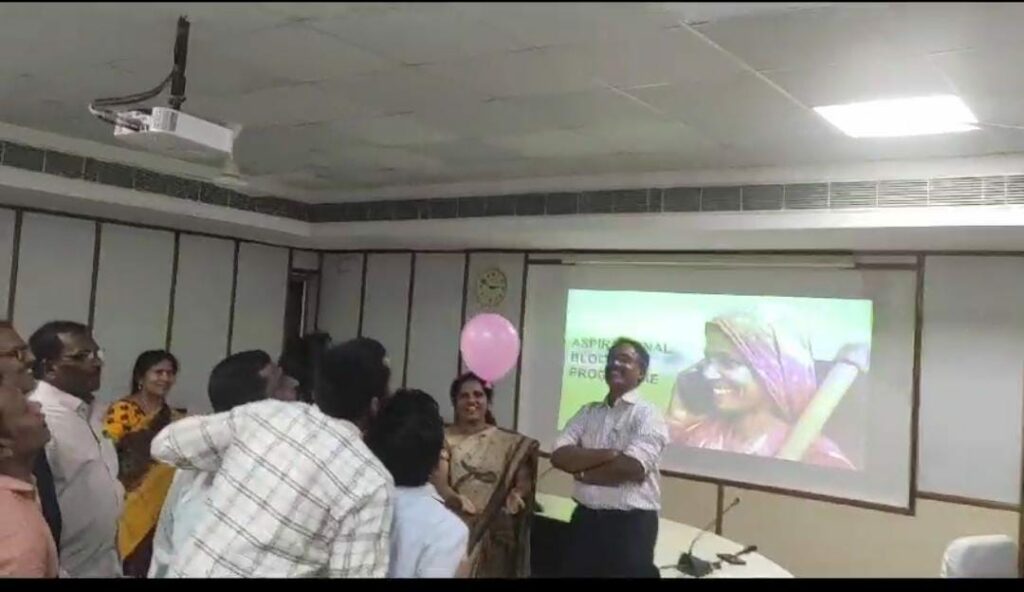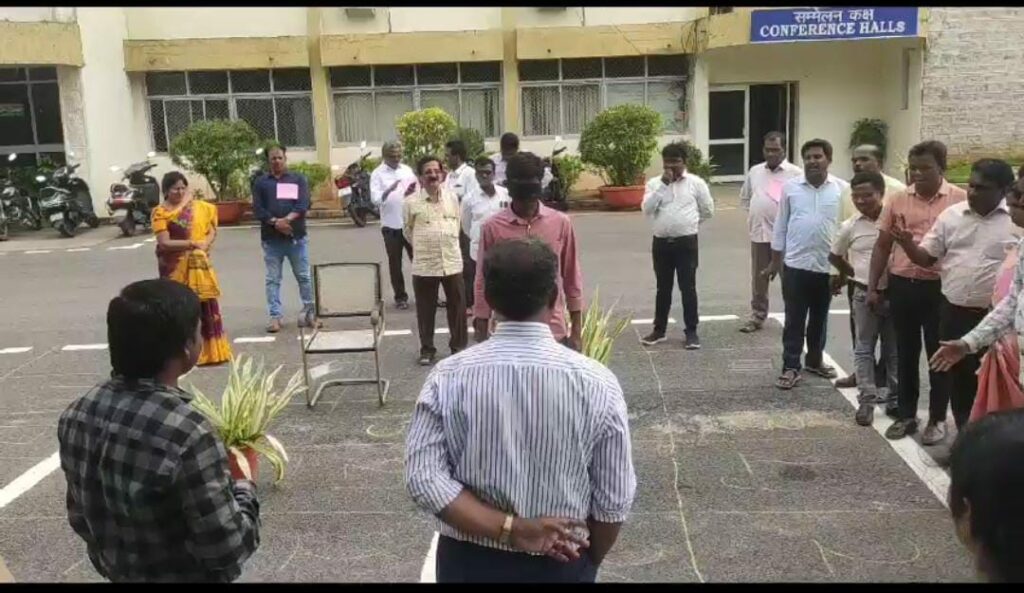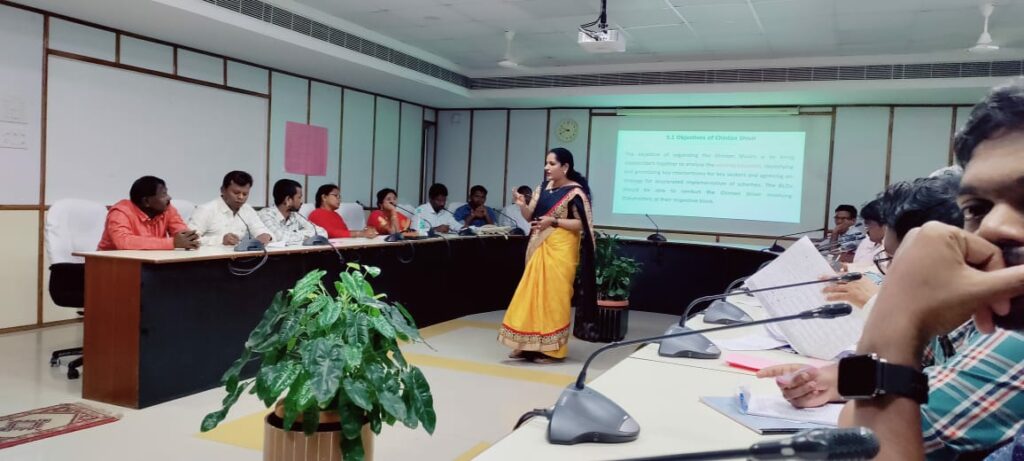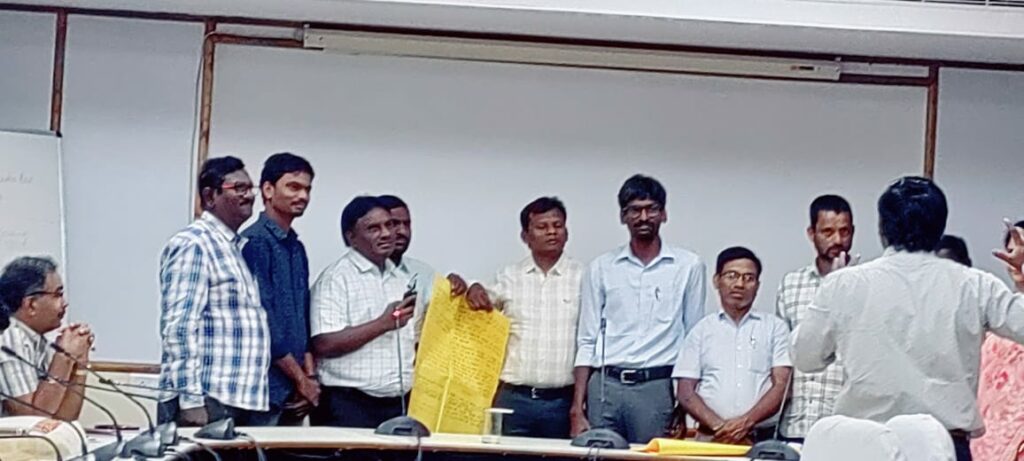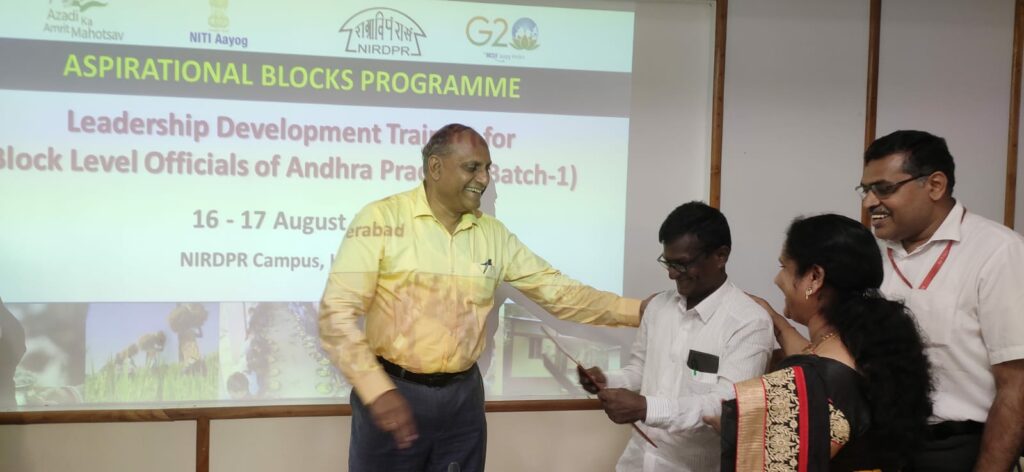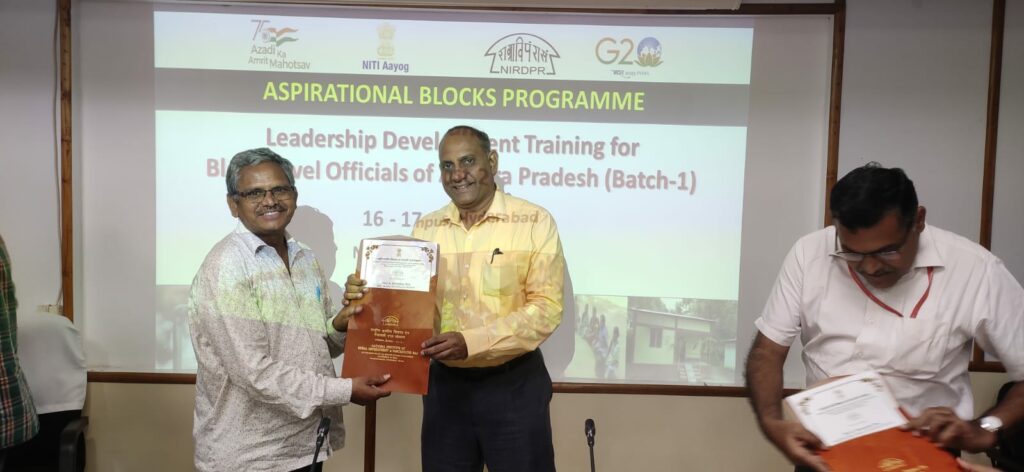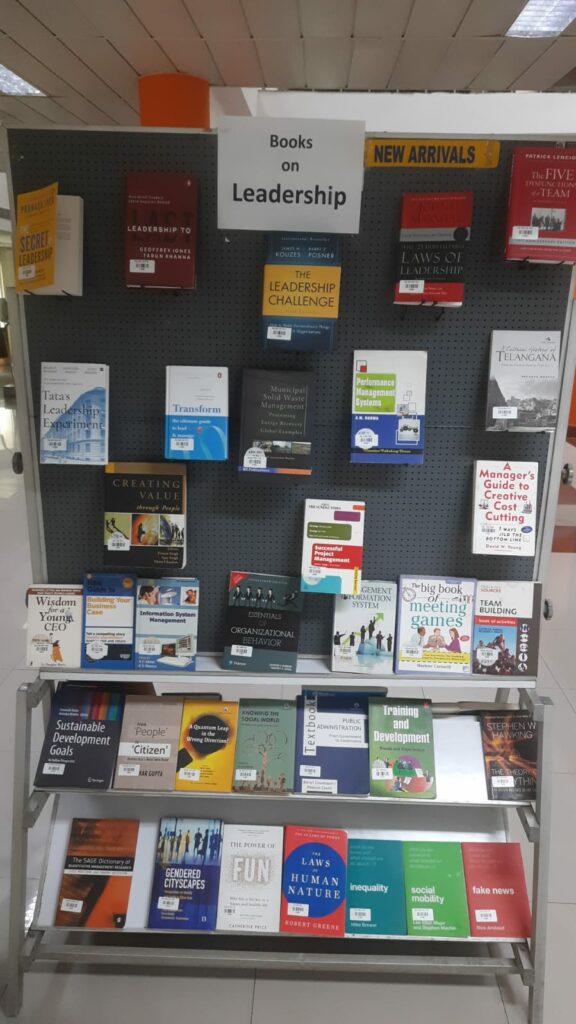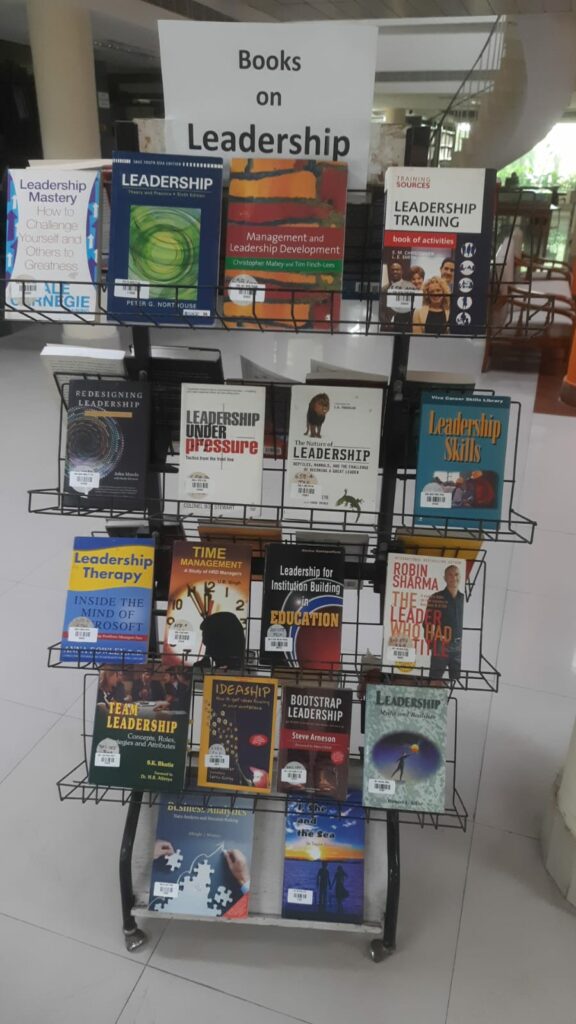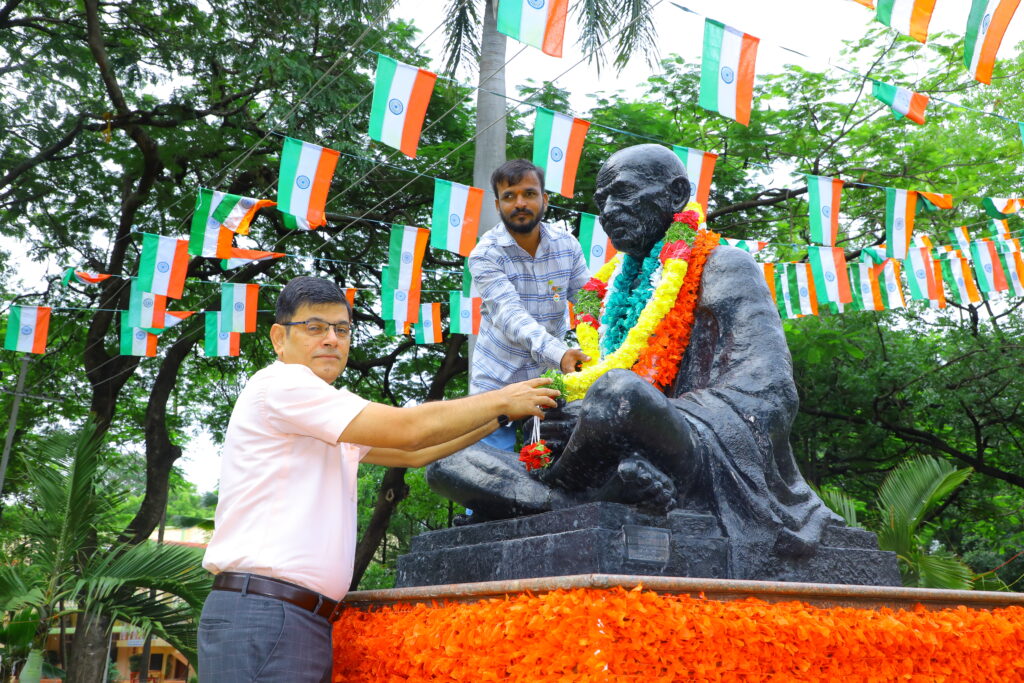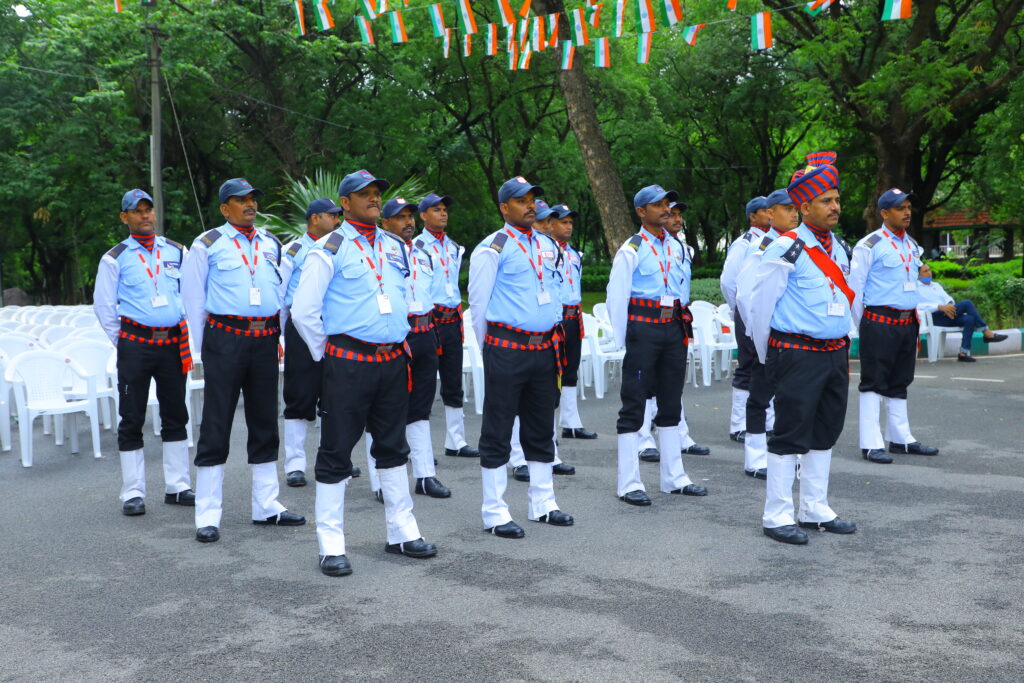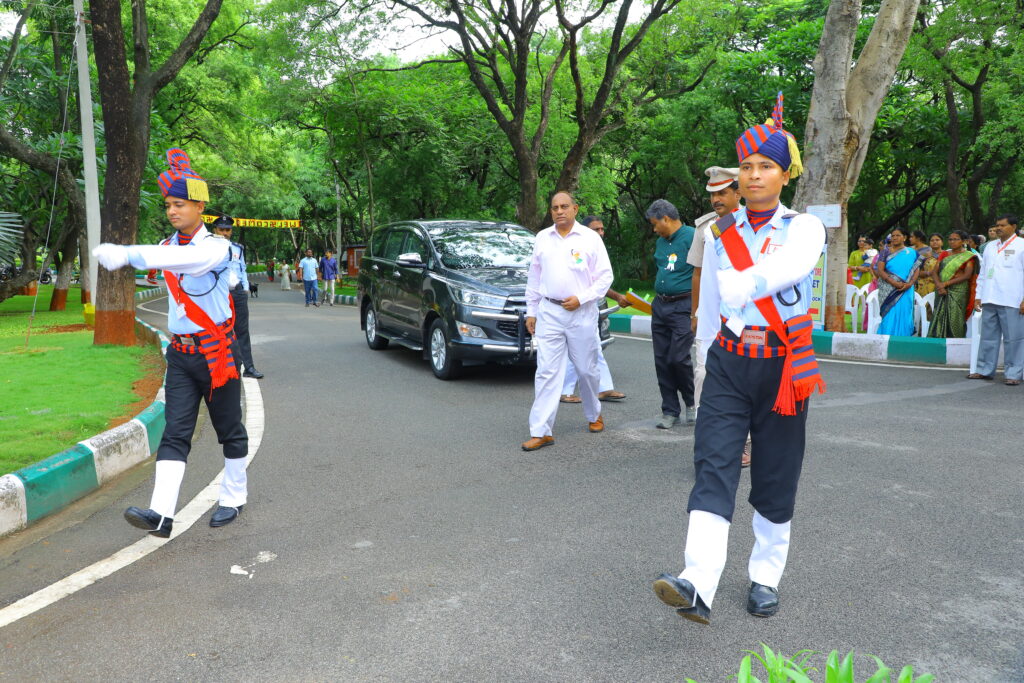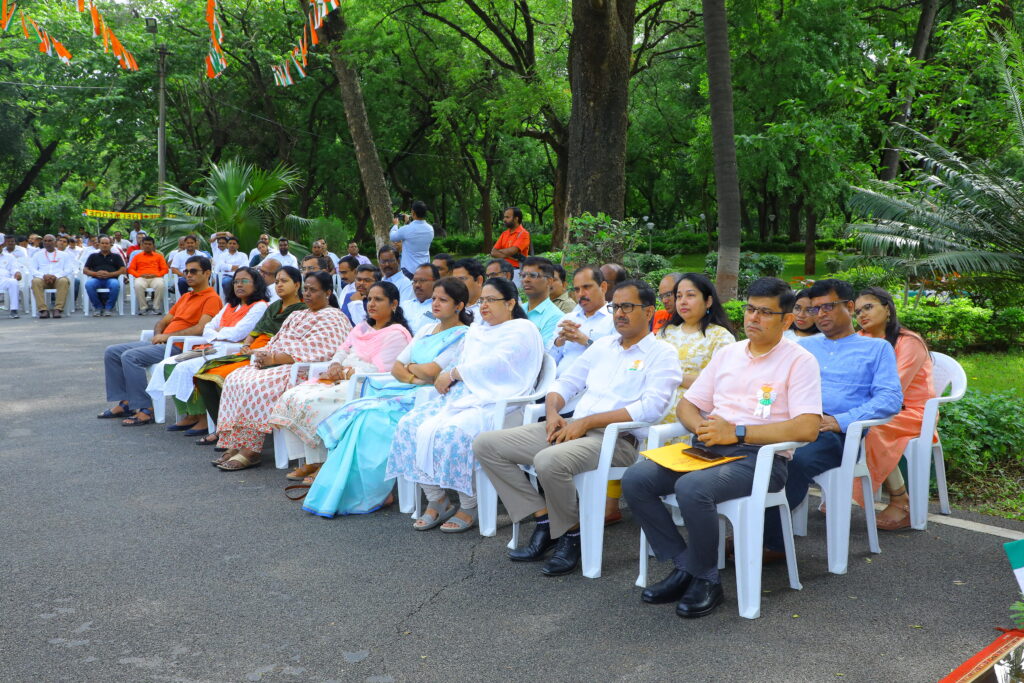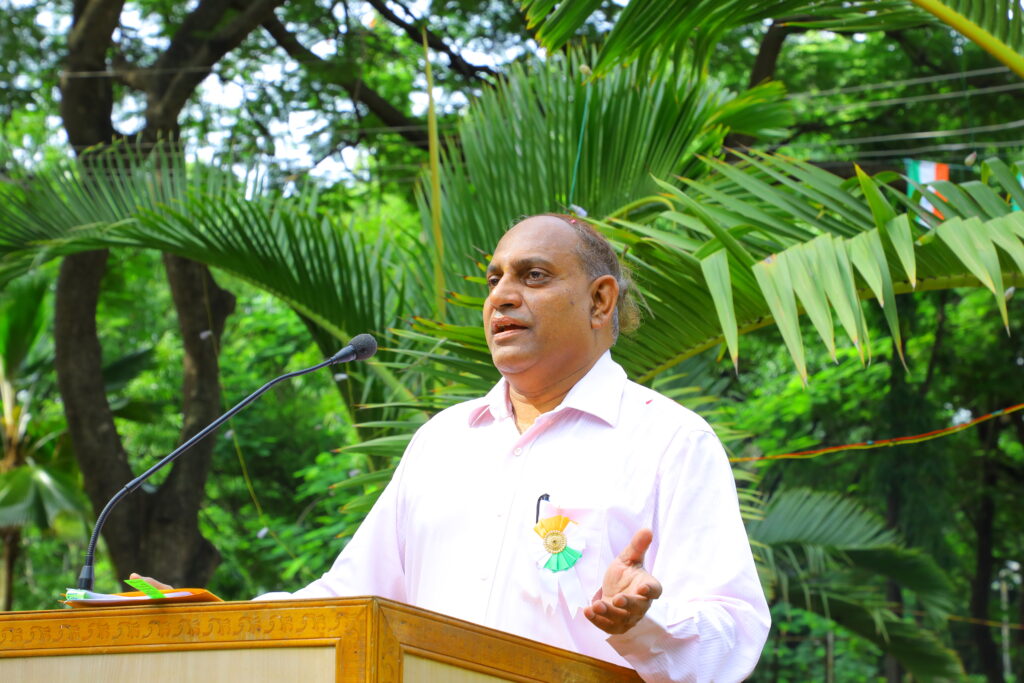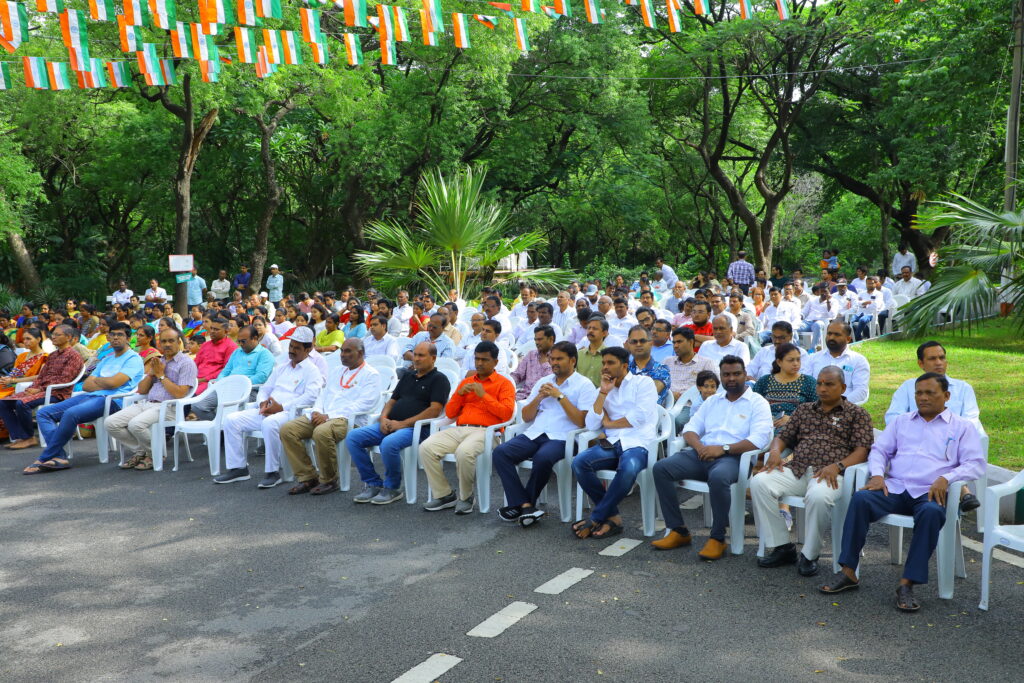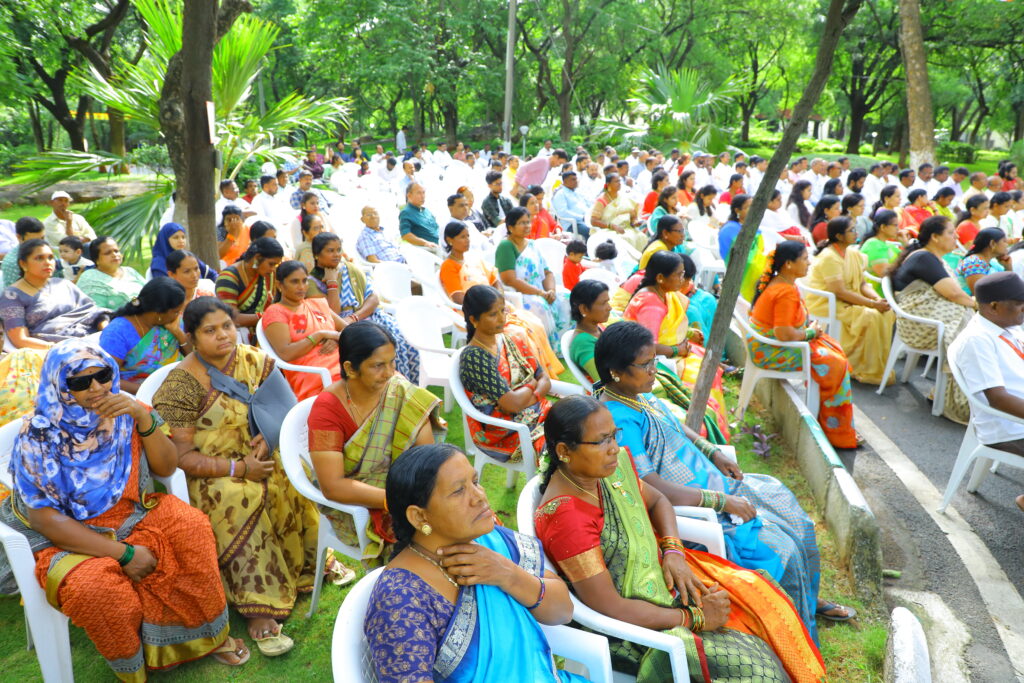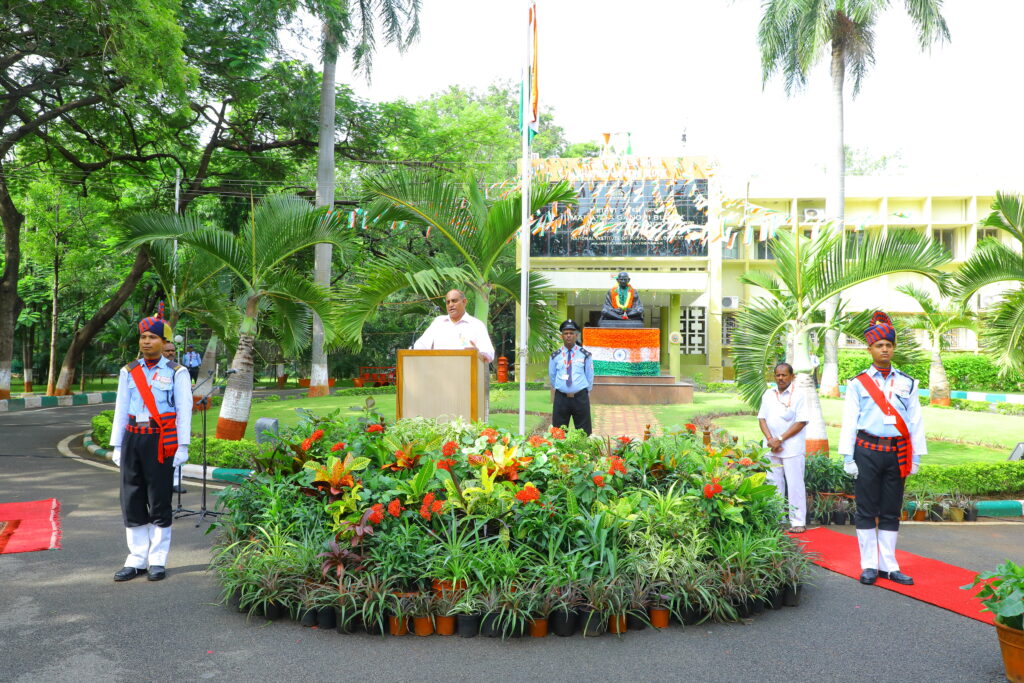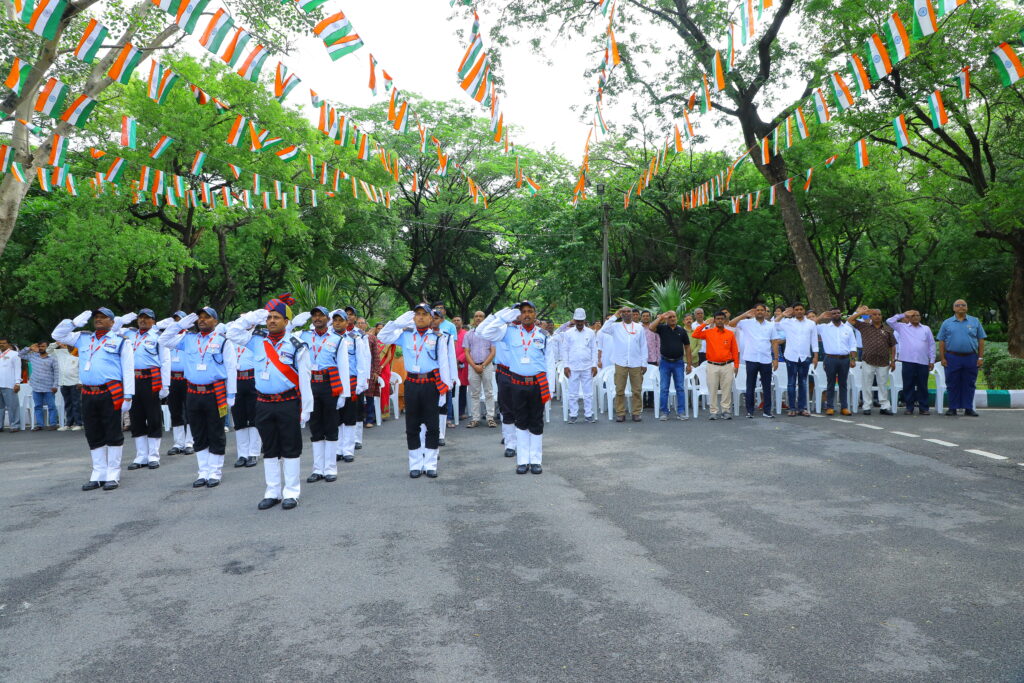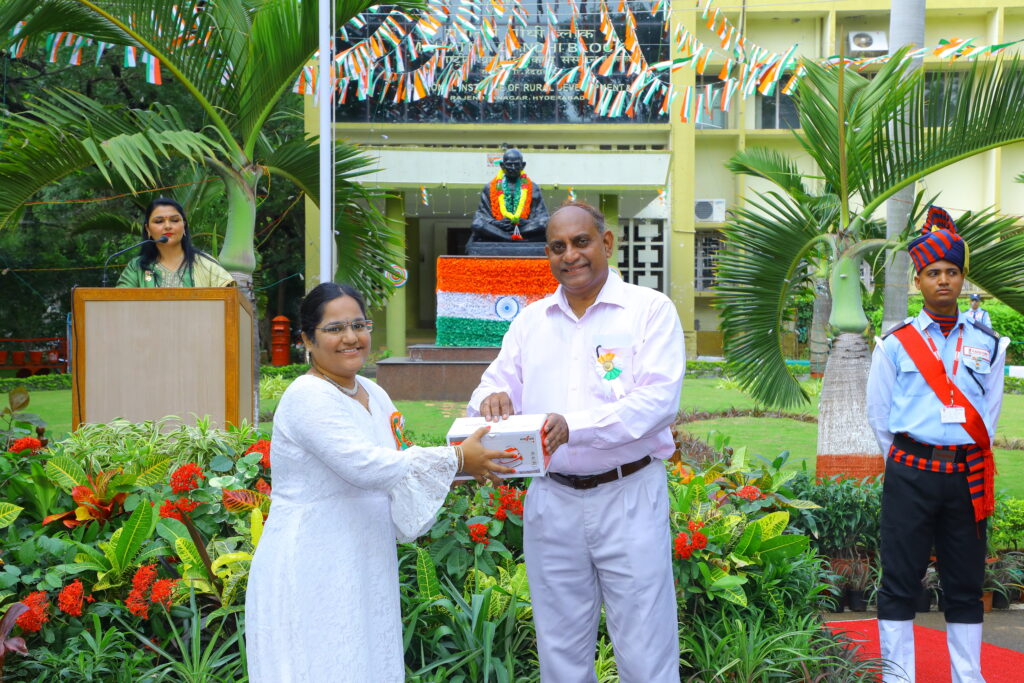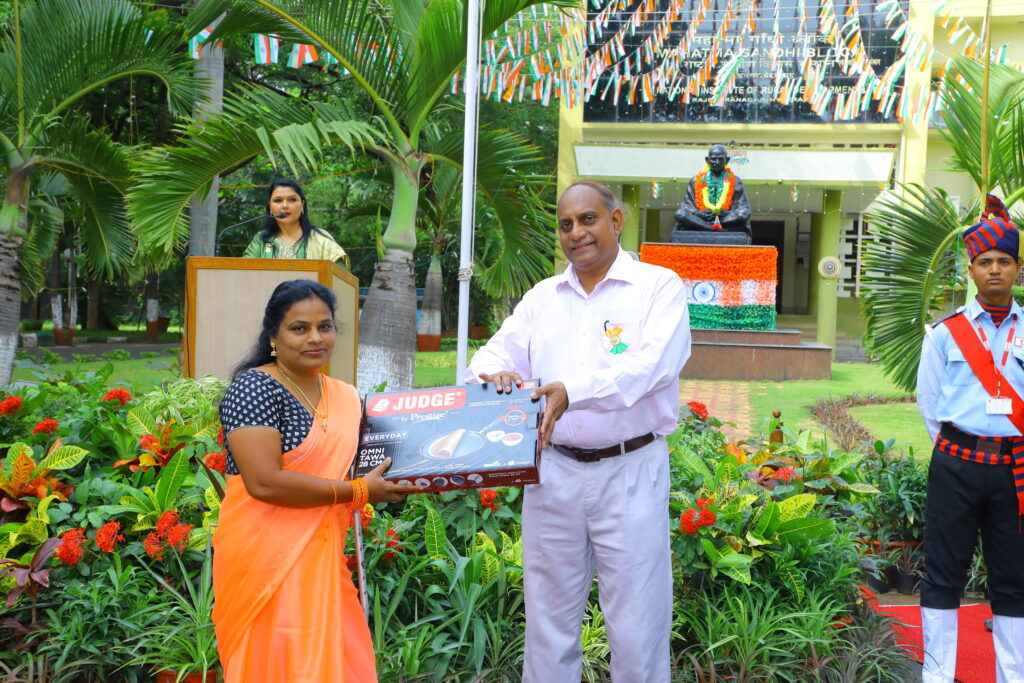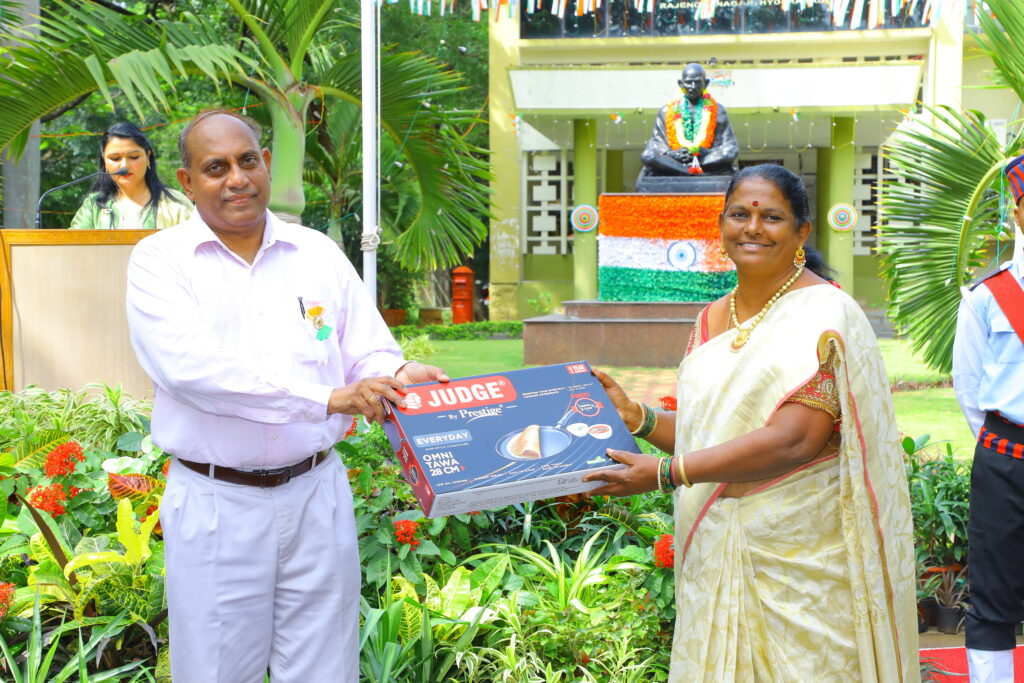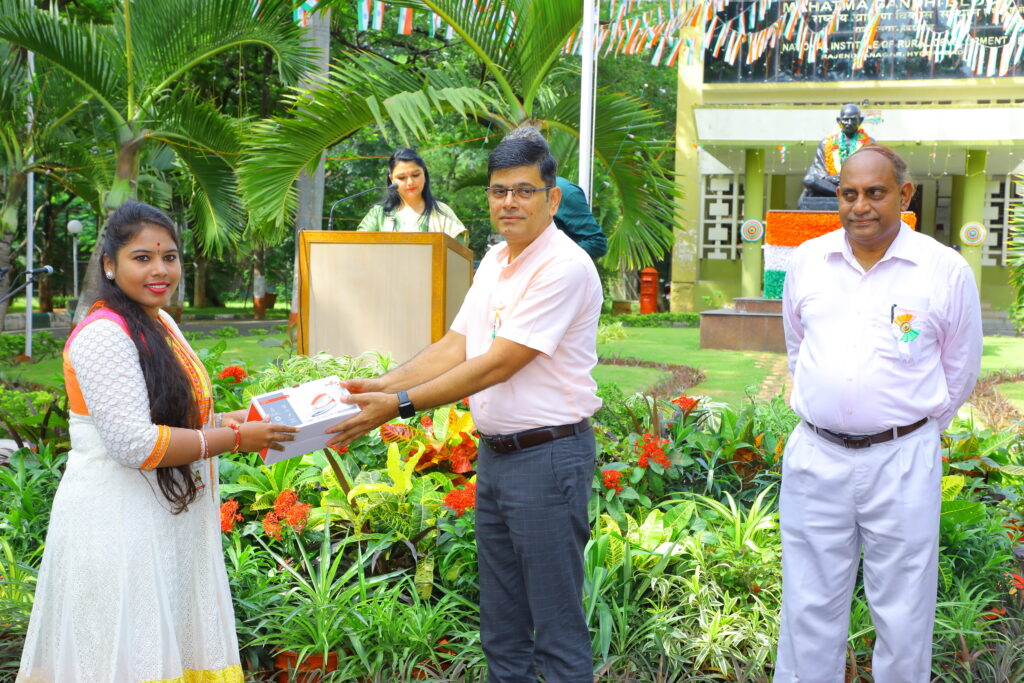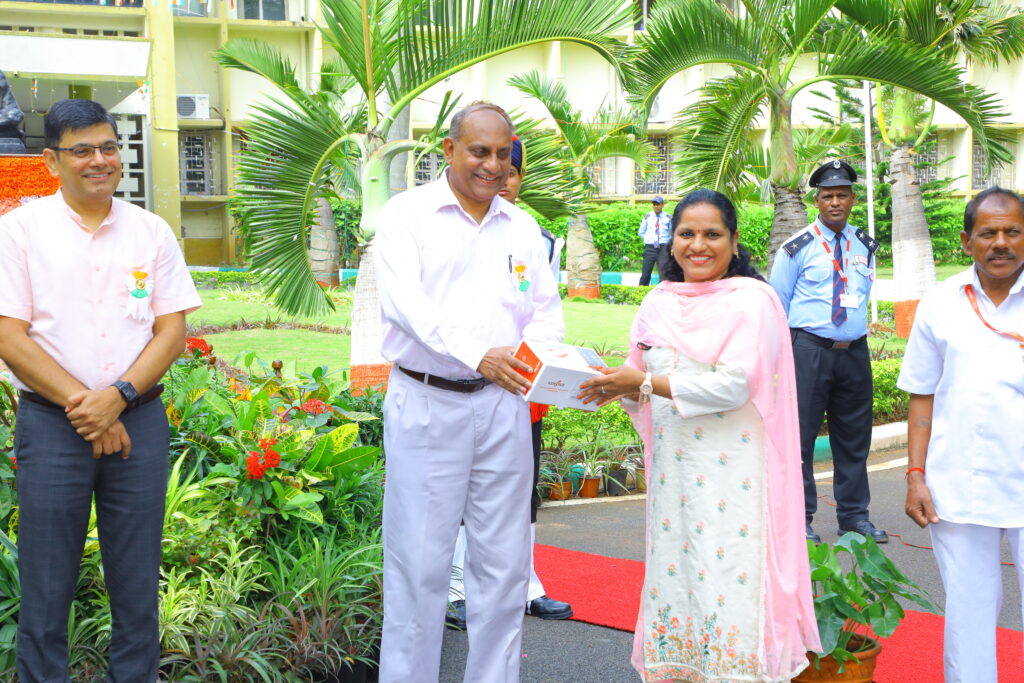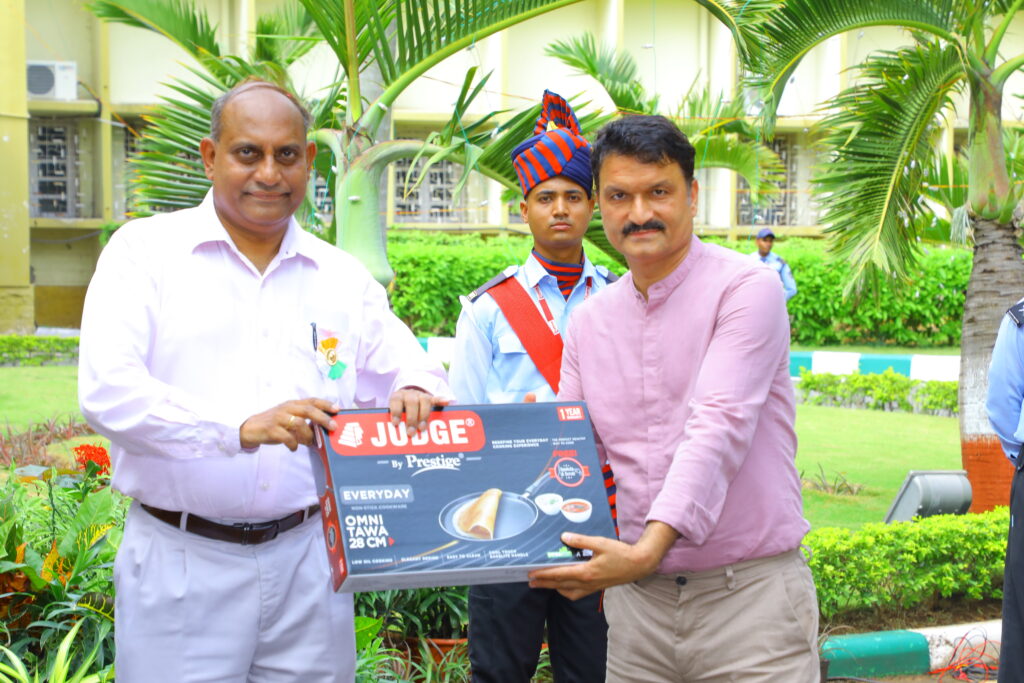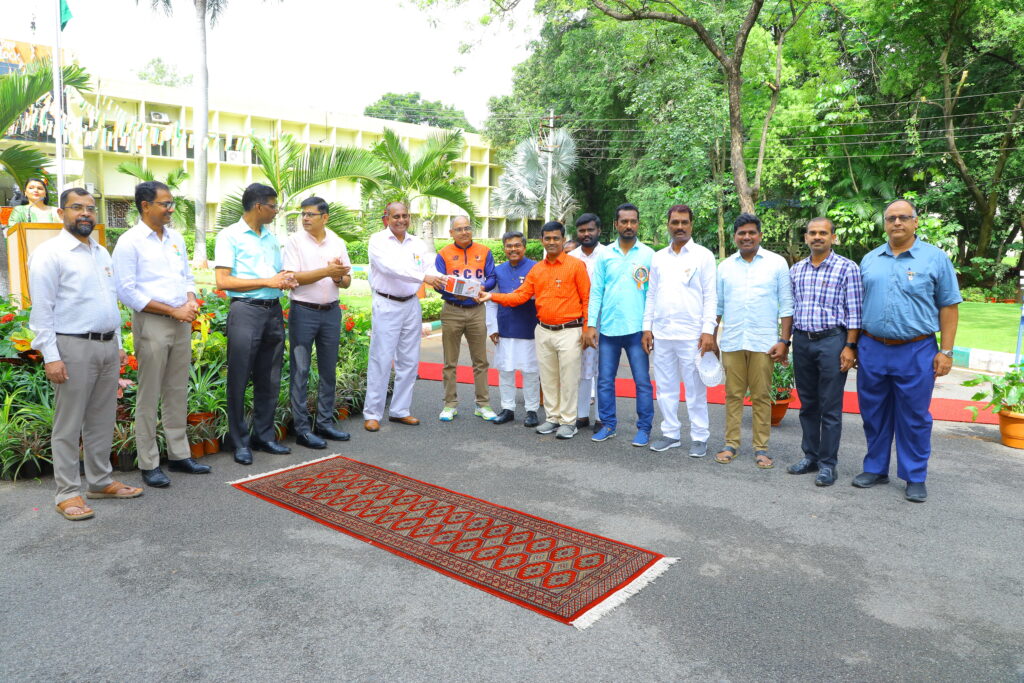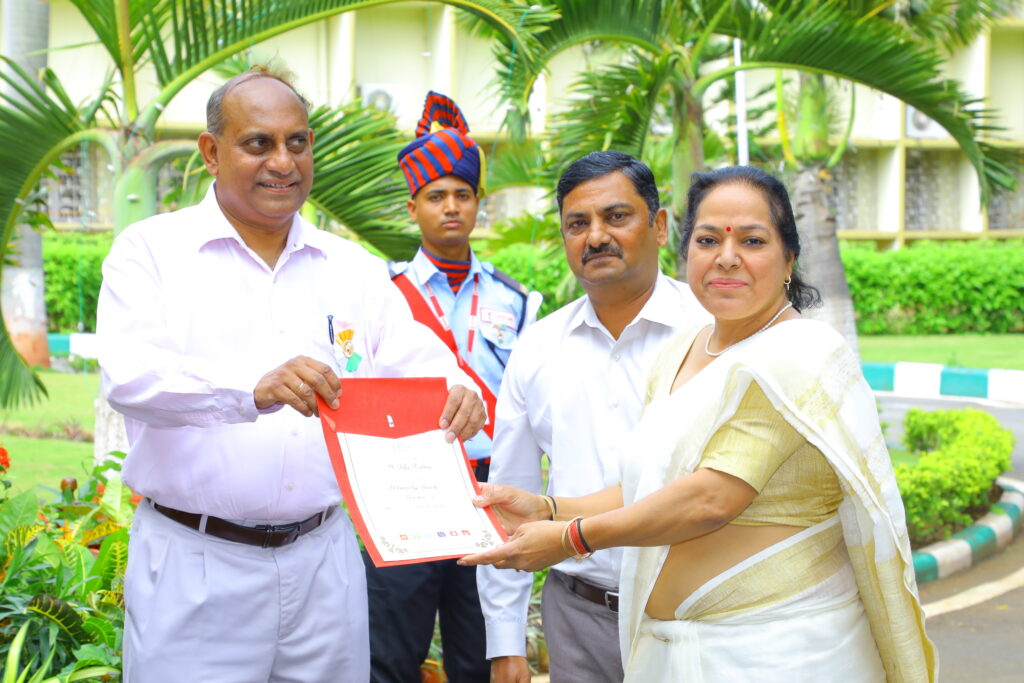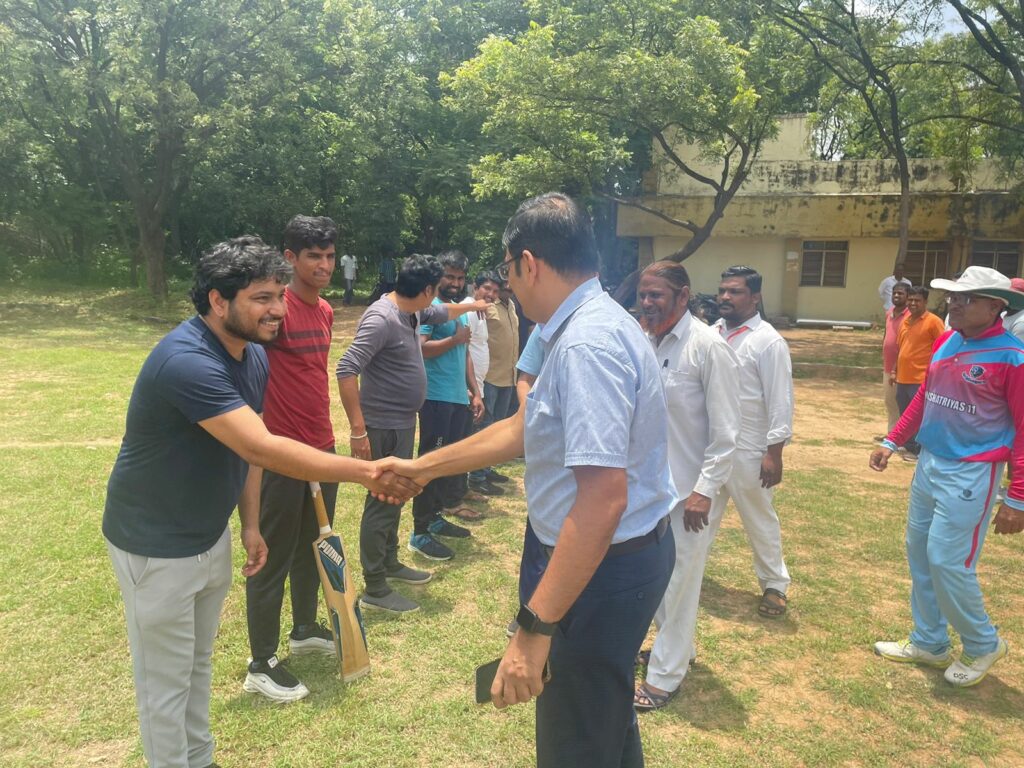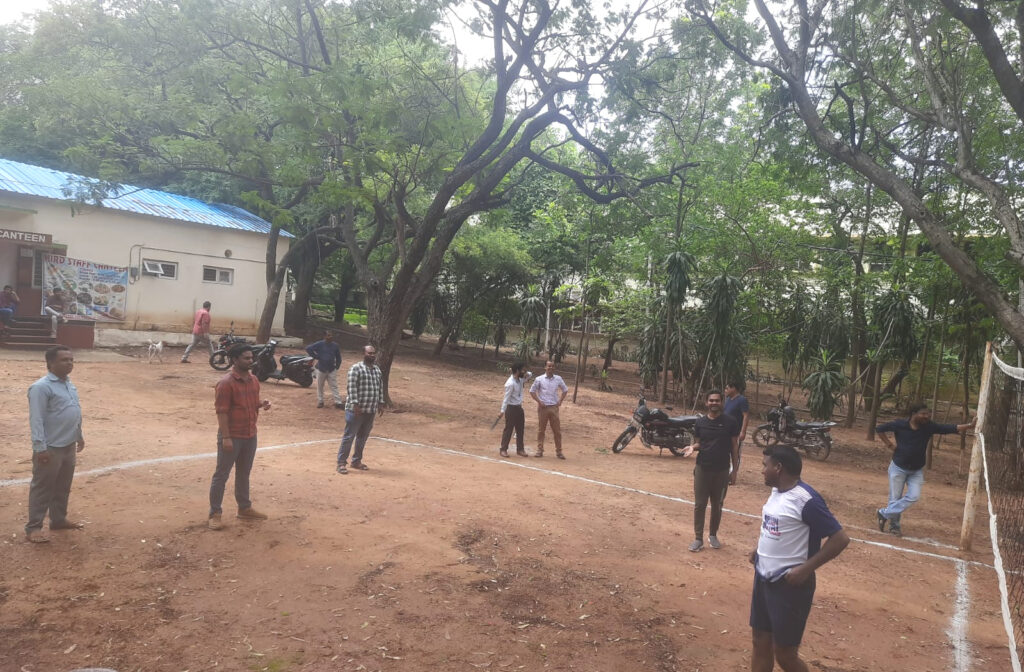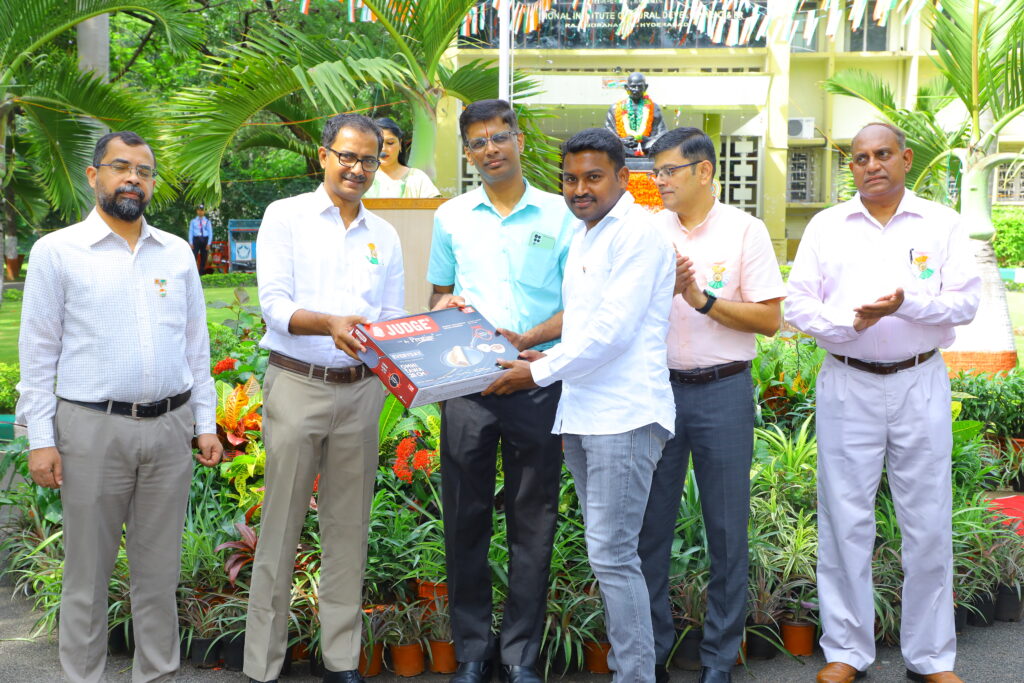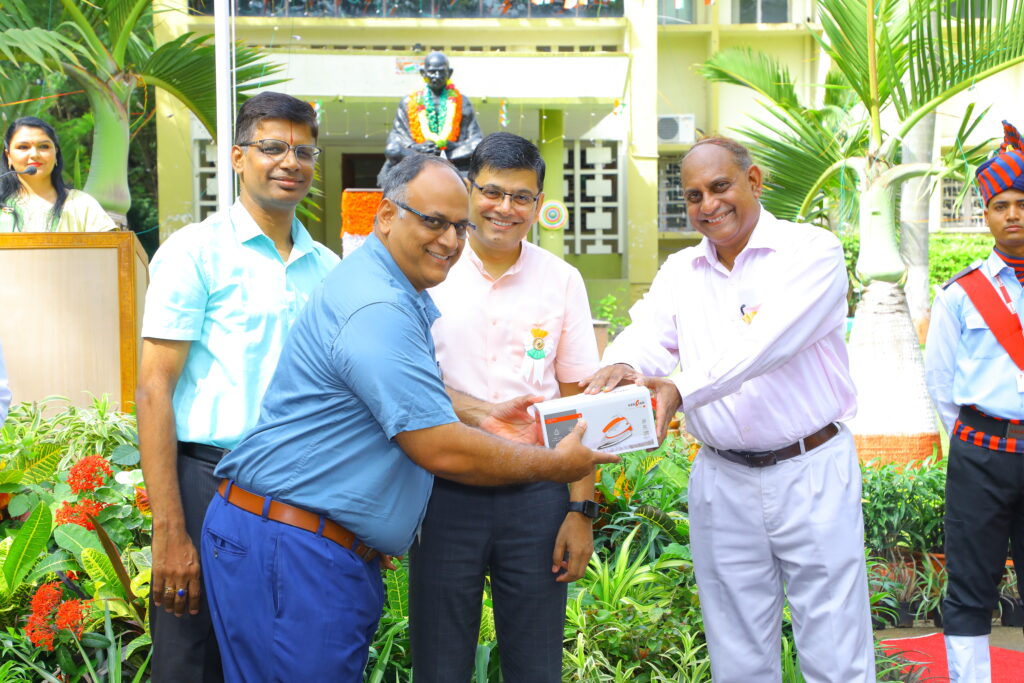
CONTENTS:
LEAD STORY: NIRDPR Rolls Out Training As Part of NITI-Aayog Aspirational Blocks Programme (ABP)
NIRDPR Celebrates 77th Independence Day
ToT on Entrepreneurship & Sustainable Livelihood Models for Rural Communities
CNRM, CC & DM, NIRDPR Conducts Training Programme for the Fishery Officers from Odisha
CWE&L, NIRDPR Offers Cluster Facilitation Project Teams Training for GIS Experts
ToTs on GIS-based Planning and Monitoring of MGNREGA at GP level Using Yuktdhara
Members of All India Senior Citizens Confederation Visits NIRDPR
TOLIC – 2 Organises Hindi Technical Workshop at ICAR-IIOR
NIRDPR Observes Organ Donation Day
Workshop on Implementation Framework of Mahatma Gandhi National Rural Employment Guarantee Scheme
Training Programme on Mahatma Gandhi National Rural Employment Guarantee Scheme for Inclusive Development
Training-cum-Exposure Visit to Best Practices and Cross-Learning Programmes under MGNREGS in Kerala
ToT Programme on Marketing Skills for SRLM Officials at CGC, Vaishali
ToT Programme on Tools and Techniques for Good Governance in Public Service Delivery
NIRDPR-NERC Organises Training Programme on Strategies for Planning and Implementation of Carbon-Neutral Villages
LEAD STORY:
NIRDPR Rolls Out Training As Part of NITI-Aayog Aspirational Blocks Programme (ABP)
The Aspirational Blocks Programme (ABP) was launched by the Hon’ble Prime Minister Shri Narendra Modi on January 7 2023, during the 2nd National Conference of Chief Secretaries. The Programme focuses on improving governance to enhance the quality of life of citizens in the most difficult and underdeveloped Blocks of India by converging existing schemes, defining outcomes, and monitoring them on a constant basis.
An Inter-Ministerial Committee in consultation with States has identified 500 Blocks from across 27 States and 4 Union Territories of India. In each of them, the ABP will focus on monitoring key socio-economic indicators categorised under major sectors, namely Health and Nutrition, Education, Agriculture and Allied Services, Drinking Water and Sanitation, Financial Inclusion, Basic Infrastructure and overall Social Development. The Inter-Ministerial Committee also recommended taking up key indicators across health, nutrition, drinking water and sanitation, livelihood, education, agriculture & allied services, and basic infrastructure, on which performance of Blocks should be measured. Additionally, since it is expected that Blocks in different regions may have diverse challenges, a provision has been kept for the States to add their own specific indicators.
ABP identifies Block Level Officials as Leaders of Change. Equipped with the right skills and competencies, it is expected that Block level Officials for Health, Nutrition, Education, Panchayati Raj, Social Development, Water and Sanitation, etc., will steer and drive the change in aspirational blocks under the guidance and support of district and State level officials.
Capacity building is a central component of the ABP with an emphasis on enhancing governance via capacity building. Capacity building under ABP includes enabling the stakeholders with the necessary expertise, knowledge, and assets required for effective execution and to sustain the Programme over time.
The ABP capacity building strategy is centred on Programme Orientation and Leadership training, Building domain expertise, Use of iGOT for Capacity Building and Partnership with NIRDPR and SIRDs. As part of this partnership, NITI Aayog and State Governments shall work with the National Institute of Rural Development and Panchayati Raj (NIRDPR), State Institutes for Rural Development (SIRDs) and Administrative Training Institutes in States to support continuous capacity building using the modules and master trainers developed for Block Level Officials. (Source: Aspirational Blocks Programme: Programme Primer & Block Development Strategy, 2023)
In this connection, NIRDPR launched its first training programme in the series on 16th August 2023.
Leadership Development Programme for Block Level Officials of Andhra Pradesh (Batch-1)
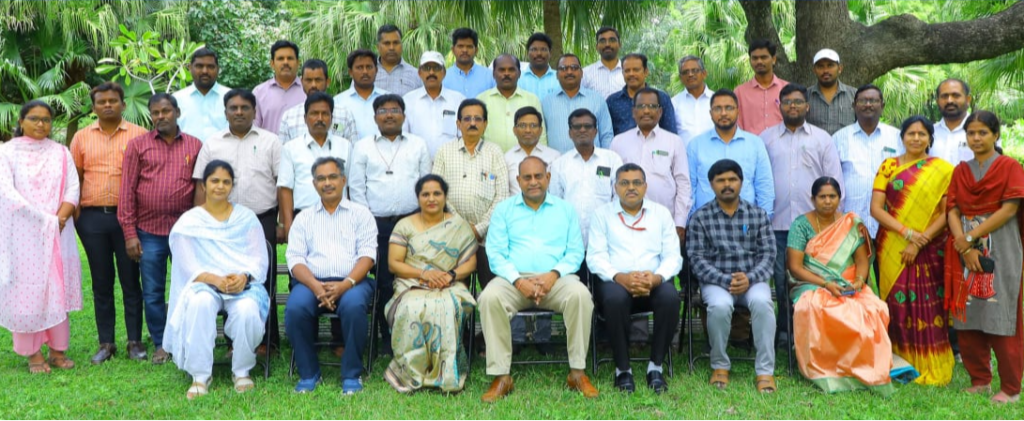
The Centre for Wage Employment and Livelihoods (CWE&L) organised a NITI- Aayog Aspirational Blocks Programme (ABP) on Leadership Development for Block Level Officials from Andhra Pradesh (Batch-1) from 16th – 17th August 2023 at NIRDPR, Hyderabad. In total, 30 Block level officials from Gangavaram (Alluri Sitharama Raju district), Maddikera (Kurnool district) and Bhamini (Parvathipuram Manyam district) Blocks attended the first training programme under the Aspirational Blocks Programme.
The programme was coordinated by Dr. Anuradha Palla, Assistant Professor, Dr Raj Kumar Pammi, Assistant Professor and Dr G.V. Krishna Lohidas, Sr. Assistant Professor, Centre Wage Employment and Livelihoods (CWE&L), NIRDPR.
Leadership Development Programme for Block Level Officials of Telangana (Batch-1)
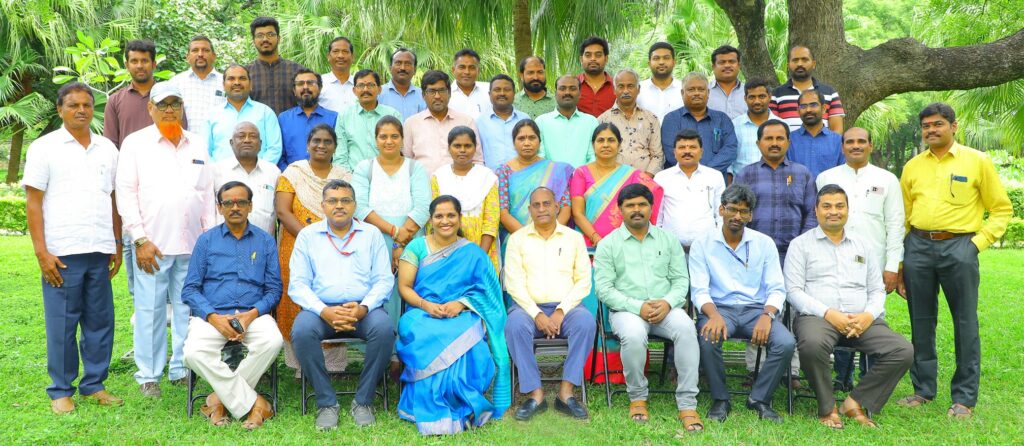
The Centre for Wage Employment and Livelihoods (CWE&L) organised a NITI- Aayog Aspirational Blocks Programme (ABP) on Leadership Development for Block Level Officials from Telangana State (Batch-1) from 18th – 19th August 2023 at NIRDPR, Hyderabad. Altogether, 34 participants attended the first batch of the training programme from four Blocks of Telangana State, namely Narnoor, Gundala, Mutharam and Palimela. The participants were senior and middle-level block officials working in the Agriculture, Water Resources, Sanitation, Health, Nutrition, Education, Engineering and Social Development sectors.
The programme was inaugurated by Dr G. Narendra Kumar IAS, Director General, NIRDPR in the presence of Dr C. Kathiresan, Associate Prof. & Head, CRTCN and Mr Pedababu, Consultant, NITI Aayog, New Delhi. The course design was briefly presented by Dr. Raj Kumar Pammi, Course Director and Assistant Professor, CWEL.
CWE&L faculty members Dr Raj Kumar Pammi, Dr G. V. Krishna Lohi Das and Dr Anuradha Palla, acted as Resource Persons and conducted the two-day training covering eight topics on leadership development module for block level officials, namely
- My Claim to Fame
- Being A Change Leader
- Aspirational Blocks Programme: Aspire to Inspire
- Getting ready for block Development Strategy
- Block Development Strategy for Transformation (Chintan Shivirs)
- Power of Working Together
- Good Governance in Blocks and
- Aspirational Blocks Programme as Jan Andolan
At the valedictory session, the participants said that they have upgraded their knowledge, skills and attitudes in the area of leadership, convergence, collaboration, and development of ABP strategy and ABP as Jan Andolan. Furthermore, they highlighted that they will organise Chintan Shivirs at Block level in the back-home situation.
The programme was coordinated by Dr Raj Kumar Pammi, Assistant Professor Dr. Anuradha Palla, Assistant Professor and Dr G.V. Krishna Lohidas, Sr. Assistant Professor, Centre Wage Employment and Livelihoods (CWE&L), NIRDPR.
ABP on Leadership Development for Block Level Officials of Andhra Pradesh from 29th-30th August 2023
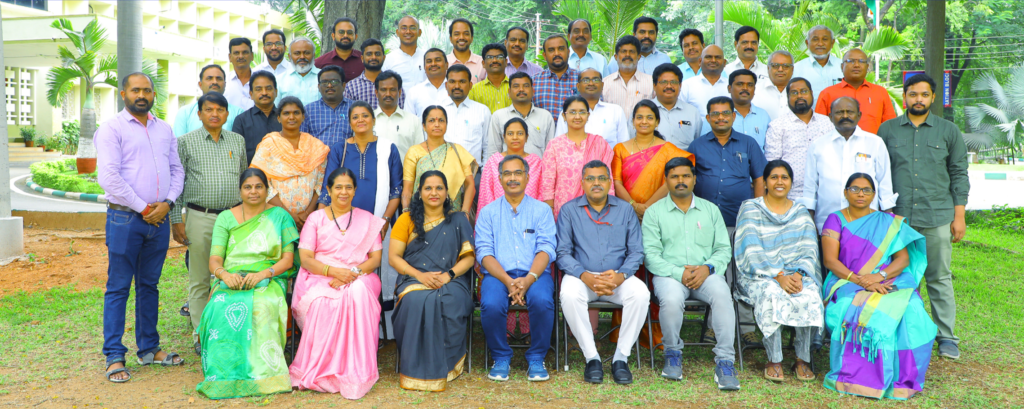

The Centre for Wage Employment and Livelihoods (CWEL) organised an NITI-Aayog Aspirational Blocks Programme (ABP) on Leadership Development for Block Level Officials of Andhra Pradesh State (Batch-3)” from 29th-30th August 2023at NIRDPR, Hyderabad. Altogether, 45 participants attended the programme from various Blocks of Andhra Pradesh State, namely Y. Ramavaram, Kodur, Maredumilli, Chippagiri and Lakkireddy Palli. The participants are senior and middle level Block officials working in Agriculture, Water Resources, Sanitation, Health, Nutrition, Education, Engineering and Social Development sectors.
The programme was inaugurated by Dr G. Narendrakumar IAS, Director General NIRDPR and Dr. C. Kathiresan, Head, CRTCN. The programme was coordinated by Dr. Raj Kumar Pammi, Assistant Professor, Dr P. Anuradha Assistant Professor and Dr G. V. Krishna Lohidas, Sr. Assistant Professor, Centre Wage Employment and Livelihoods (CWE&L), NIRDPR.
As part of the training programme, the CDC library arranged a display of books on leadership. The programme was well appreciated by participants as well as NITI-Aayog officials.
It is a great programme designed to uplift the poor people in many respects and has a lot of dimensions. We are fully equipped to know the realities with participatory approach in Blocks and ready to face all challenges in Blocks through convergence method. With the support of NITI Aayog and NIRDPR, we can bring all-round development in our Blocks on par with the State.
B. Srinivasulu, MPDO, Gangavaram (1st batch, Andhra Pradesh)
PHOTO GALLERY
NIRDPR Celebrates 77th Independence Day
The National Institute of Rural Development and Panchayati Raj, Hyderabad, on 15th August 2023, celebrated 77th Independence Day with fervour.
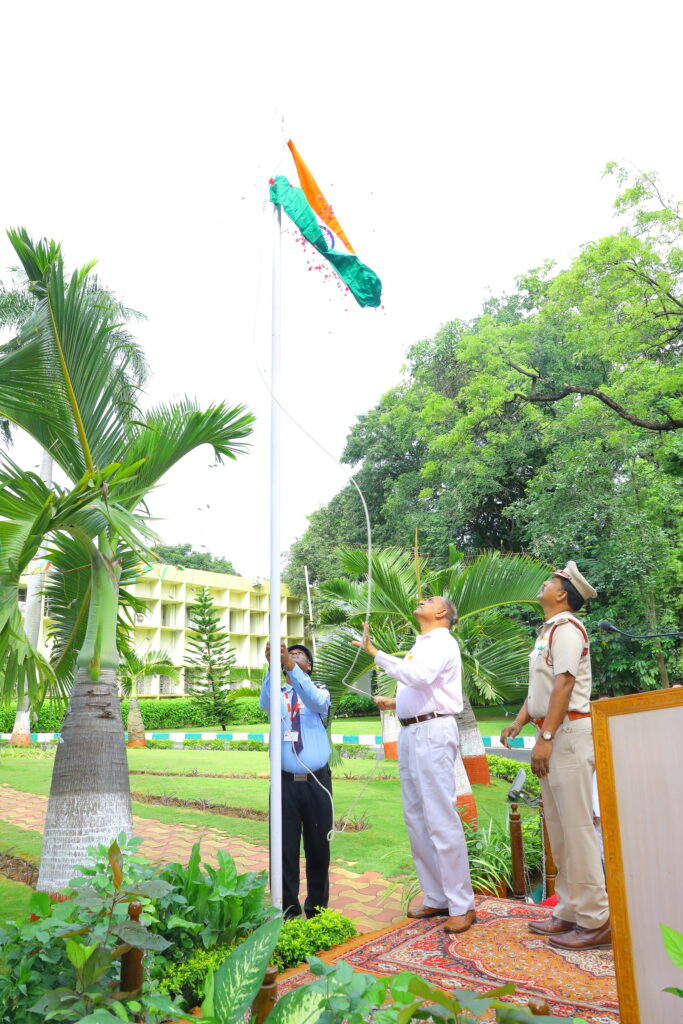
Dr. G. Narendra Kumar, IAS, Director General, NIRDPR, was the Chief Guest of the Independence Day celebrations held near the Mahatma Gandhi Block on the Institute premises. The Director General hoisted the National Flag, and it was followed by a march past taken out by the staff of security wing.
Further, Dr G. Narendra Kumar addressed the audience and extended his Independence Day greetings. “India is marching towards holistic progress. “In 100 years of our independence, we would like to see India as a developed country,” he said.
The Director General further presented a brief outline of the Institute’s journey in the last two–and–a–half years, and how it contributed to the theme of Atmanirbhar Bharat, which is a part of ‘India first, India Always, first, the theme of this Independence Day.
“At the beginning of 2021, the Institute was physically shut down due to the impact of COVID-19 pandemic. The merger of CAPART, which was different in terms of culture, working structure and financial systems, was posing challenges, besides, the massive recruitment for 250 Model GP Clusters,” he recalled and added that the Institute could successfully tread the murky water.
“Resulting from the thought process of contributing to bettering the living conditions, the Institute changed its vision towards improving the quality of life in rural areas. The deliberations on making the courses more relevant, contemporary and focused through a focused training approach that suits the stakeholders ensued in formulating a focussed training calendar and improving the rigour of the programmes,” he said.
“Subsequently, States such as Bihar and Jharkhand started approaching us for delivering programmes. The year 2022 saw improvement in financial systems. In 2023, being a think tank at the national level, we were involved in redesigning MGNREGA, and the MGNREGA annual action plan has taken shape,” he said.
“We hosted the State Finance Commissions’ Conclave by holding focused deliberations. Now, NITI Aayog has made NIRDPR an integral part of the Aspirational Blocks Programme and we are in the fulcrum of implementing it. The Ministry of MSME has approached us seeking support in taking PM Vishwakarma Yojana forward. The appreciation for NIRDPR’s think tank status has brought in a change in our profile nationally. We have now moved from the status of a flagship programme supporter to a flag-bearer. We should continue to make changes in our focused area depending upon what is evolving, what is emerging, and what is more relevant,” the DG added.
The Sports & Recreation Club of the Institute conducted various competitions for employees as part of the Independence Day celebrations. Along with the Director General, Shri Manoj Kumar, Registrar & Director (Admin), Prof. Jyothis Sathyapalan, Prof. Ravindra S. Gavali, and Shri A. S. Chakaravarthy, Director, Finance distributed prizes to winners of the competitions.
PHOTO GALLERY
Please find below the YouTube link to the event:
ToT on Entrepreneurship & Sustainable Livelihood Models for Rural Communities
A 5-day ToT Programme on ‘Entrepreneurship and Sustainable Livelihood Models for Rural Communities’ was jointly organised by the Centre for Entrepreneurship Development & Financial Inclusion (CEDFI) and Centre for Innovations and Appropriate Technologies for Skills and Jobs (CIATSJ) on the NIRDPR Hyderabad campus from 21st to 25th August 2023. This ToT brought in a combination of interactive classroom lectures and on-field exposure visits, peer learning, presentations and discussion on sustainable entrepreneurship and livelihood in rural India.
A total of 28 participants from 15 States, including Tripura, Arunachal Pradesh, Haryana, Rajasthan, Goa, Odisha, Chhattisgarh, Haryana, Uttarakhand, Bihar, Tamil Nadu, Gujarat, Karnataka, Madhya Pradesh, Chhattisgarh attended this programme. The participants were MGN Fellows from MSDE, Enterprise Promotion Coordinator, Senior Programme Officer from Quest Alliance, Horticulture Dept. officials, PPIA Fellows, Young Professionals of SRLM and TNRTP.
Dr Partha Pratim Sahu, Associate Professor & Head, CEDFI, NIRDPR led a session on ‘Inclusive and Sustainable Rural Enterprise Development: Opportunities, Challenges and Possibilities.’ He talked about inclusivity being a multidimensional phenomenon and contextual for any transformational change to be observed, three parameters – relevance to the villages, scalable option, and the sustainability of the initiative – need to be focused upon. The participants were introduced to various models of entrepreneurship development along with the convergence of government schemes that can leverage rural ecosystems.
The participants were appraised about the philosophy of MGNREGA that it touches the horizon of ‘Livelihood Security’ much more than employment creation. In the session ‘Emerging Livelihood Scenario and Public Employment Programmes: A Case of Mahatma Gandhi NREGA’ led by Prof. Jyothis Sathyapalan, Prof. & Head, CDC, NIRDPR, ideas like carbon neutral Panchayat and biodiversity-based livelihoods were discussed.
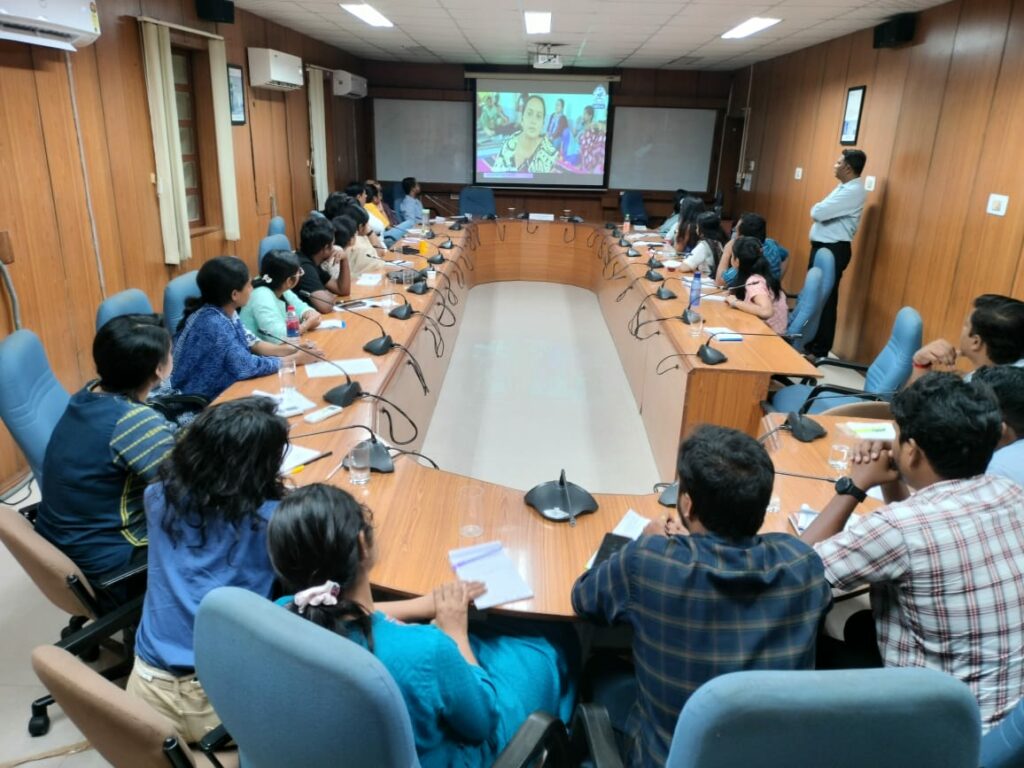
Dr Shreekant Sharma, a faculty from the National Institute for Micro, Small and Medium Enterprises, discussed the existing schemes and programmes to promote agri-entrepreneurship and also the institutions and agencies working to provide technological support towards sustainable rural entrepreneurship development. The works of Rural Technology Park were elaborately discussed by Dr. Ramesh Sakthivel, Associate Professor, NIRDPR. He explained how rural ecosystems can be embedded with low-cost production units, vermicompost and biogas micro units, and innovative housing models displayed in the Park. This session also helped the participants understand its nitty-gritty to the core and how to make it scalable and sustainable.
Gender being a cross-cutting issue and given the strong gender dimension to rural entrepreneurship, the participants were sensitised about gender and how to look at various dimensions of entrepreneurship from a gender lens.
The session on ‘Value Chain Analysis: Opportunities and Challenges’ by Dr Surjit Vikraman, Associate Professor & Head, Centre for Agrarian Studies, NIRDPR, underscored the interplay of inclusive growth, green growth, and economic and social progress within value chain analysis. This synergy offers prospects and hurdles, ultimately forging pathways towards the creation of sustainable value chains, where economic advancement harmonises with ecological responsibility and societal welfare.
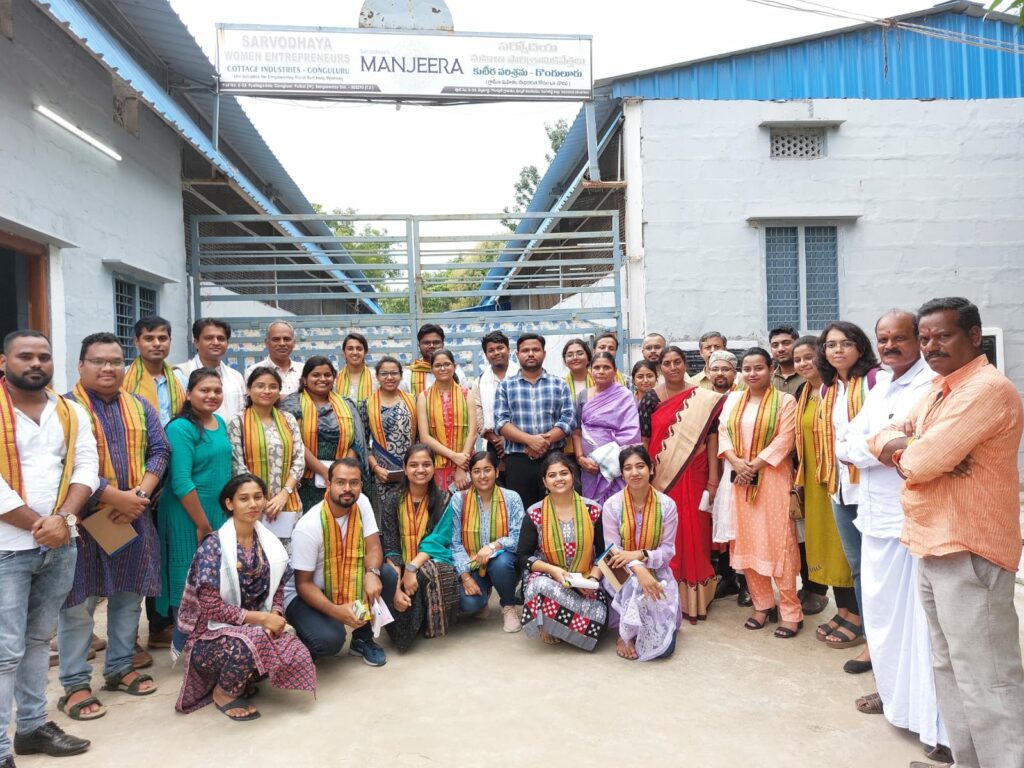
The exposure visit to Gongulur village in Sangareddy district, Telangana shed light on the commendable efforts of the Gram Panchayat, which transcended political rivalries to focus on rural development. With the support of IRS officers from Hyderabad, the villagers have showcased a holistic approach to environmental conservation with Miyawaki Park using the MGNREGA grant, ecosystem restoration by building playground over a garbage dumping area with CSR funding, educational advancement through co-curricular learning in school library, and the nurturing of entrepreneurship by Manjeera Women Group. The village’s transformation was not only an eye-opening experience but also a testimony to the positive impacts that dedicated individuals and a united community can achieve in fostering sustainable rural development.
Dr Nithya V.G., Assistant Professor, CAS, NIRDPR, in her session on ‘Collectives and Aggregation Models: Case of FPOs’, shared important aspects of FPO formation and their functioning in the country. The participants understood the coherence required in moral dimensions of business interventions, technical interventions and community interventions in the session ‘Technology, Innovation and Progress: An Opportunity for Rural Entrepreneurs’ taken by Dr Ramesh Sakthivel.
In the session ‘Potentials of Mushroom Cultivation in Promoting Entrepreneurship’, Dr Prasuna S. from RTP, NIRDPR, imparted knowledge to the participants about mushroom cultivation techniques and benefits, and how farmers in large numbers are undertaking mushroom cultivation at a business scale. Also, there was an insightful session on ‘Promotion of Aromatic Crops cultivation as an alternative to traditional crops cultivation’ by Shri Ravi Teja, of LEBURI, RTP, NIRDPR.
During the session ‘Skilling Strategies towards Sustainable Rural Enterprise Development’ by Mr Surajit Sikdar, Assistant Director, Skill and Innovation Hub, NIRDPR, there was a detailed discussion on the policy design framework of the recently announced PM Vishwakarma scheme. Dr Jyoti Prakash Mohanty (NIRDPR) spoke about the remarkable success of the marketing initiatives of ORMAS – OLM Odisha. He discussed many interventions that ORMAS is taking to help SHG-based entrepreneurs successfully market their products.
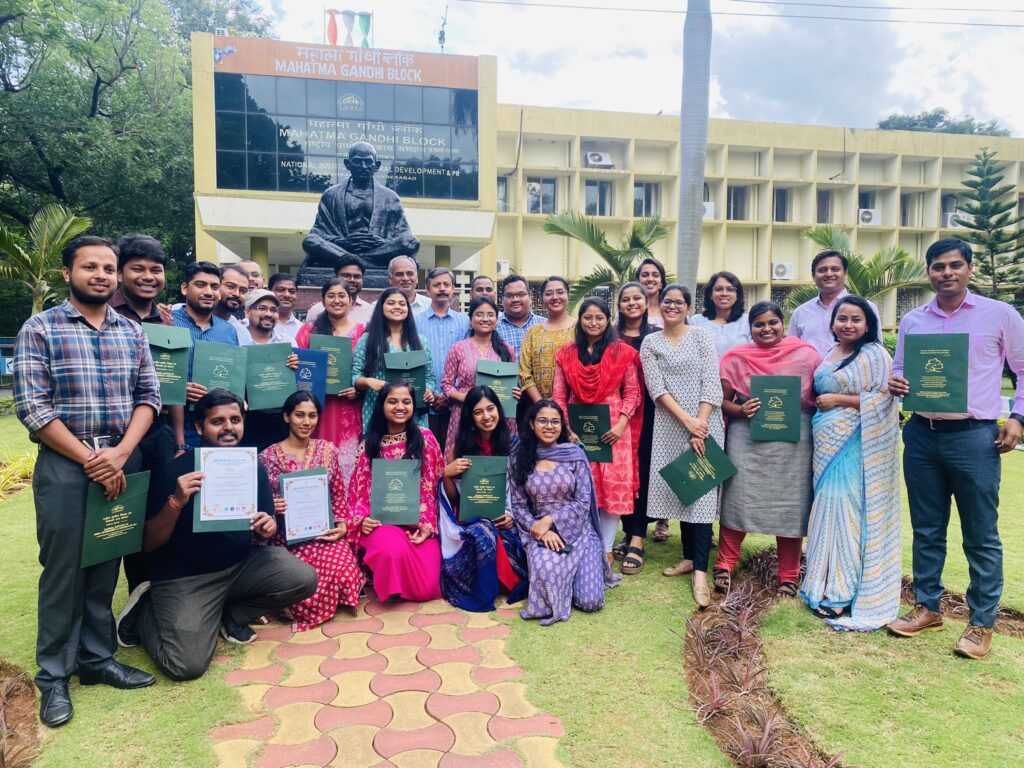
In the end, participants provided detailed feedback and shared their thoughts, experiences and learnings. This 5-day ToT was jointly conducted by Dr Partha Pratim Sahu and Dr Ramesh Sakthivel.
The 5-day ToT provided an insightful platform for discussion on a varied set of topics – from basics of mushroom and lemon grass cultivation to value chain analysis and critical review of different schemes. There were also multiple new learnings in terms of research works, approaches and inspiring initiatives of fellow participants. Further, the field visit to Gongulur village offered a holistic learning experience.
Ms Krithika V.G. YP, TNRTP, Tamil Nadu
(Note: This report is prepared by Mr Dhairya Trivedi and Ms Bhavya Pathak with inputs from Dr Partha Pratim Sahu)
CNRM, CC & DM, NIRDPR Conducts Training Programme for the Fishery Officers from Odisha
The Centre for Natural Resource Management, Climate Change and Disaster Mitigation, NIRDPR, organised a six-day training programme on ‘Development of Managerial Skill, Leadership Development, Extension and Accounting for the Fishery Officers, Govt. of Odisha’ from 07th to 12th August 2023. A total of 34 Assistant Fishery Officers of the Fishery Department, Odisha State, attended the training programme.
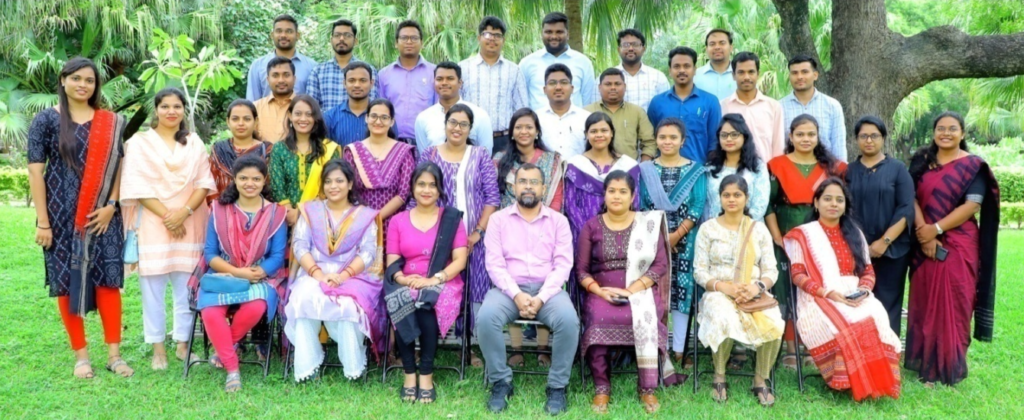
The objectives of the programme were to i) Enhance managerial skills, train fishery department officers in decision-making, strategic planning, leadership, communication, team building, and conflict resolution to improve managerial capabilities, ii) Improve Extension Techniques, and equip officers with modern extension methodologies, community engagement, and technology usage to effectively disseminate knowledge and promote sustainable fishery practices among stakeholders, and iii) Strengthen Accounting and Financial Management Skills, enhance officers’ accounting proficiency for transparent financial practices, budgeting, and resource allocation to ensure efficient financial management within the fishery department.
Dr Ravindra S. Gavali, Professor & Head, CNRM, CC & DM, NIRDPR, Hyderabad, welcomed the participants and conveyed the objectives of the training programme. Setting the tone for the training programme, he highlighted the importance of the fishery sector’s growth and development.
Dr A. Madhuri, Senior Executive (Tech), NFDB, addressed the first session, highlighting sustainable fisheries, the role of Fishery Officers, and responsible fishing. She also highlighted the key features of the Pradhan Mantri Matsya Sampada Yojana (PMMSY) to boost fish production, modernise the industry, and promote aquaculture. Dr Swarnalatha Jagarlapudi, Professor, ASCI, conducted the second technical session on ‘Managing Stress at the Workplace.’ Her insightful presentation explored strategies for dealing with workplace stress effectively. She emphasised the importance of recognising stress triggers, practising mindfulness techniques, and fostering a supportive work environment.
Dr Akanksha Shukla, Associate Professor, CPGS&DE, NIRDPR took an informative session on ‘Information Dissemination and Communication Skills, Use of Local and Social Media for Dissemination of Suitable Packages and Practices for Fishery Officers.’ She highlighted the significant role of effective communication in the dissemination of fisheries-related information.
Dr A. K. Saxena, Professor (Retd), SVPNPA took an engaging technical session on leadership and motivation skills. He blended theory with a practical approach, using fun games to illustrate key concepts.
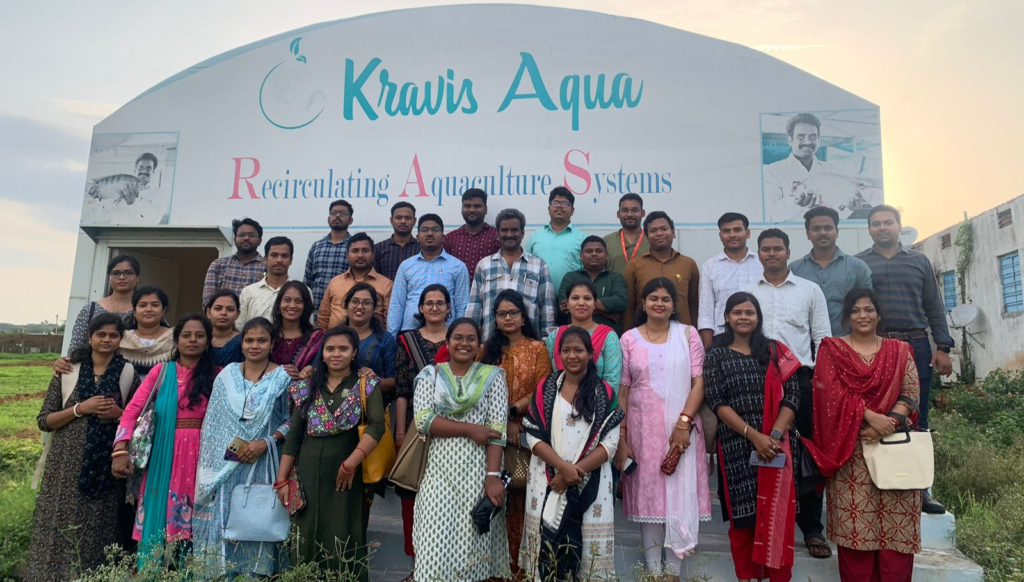
As an integral component of the training programme, the participants visited the Kravis Aqua Farm at Balanagar. Mr. Vishwanatha Raju, MD of Kravis Aqua took a session and explained the Recirculating Aquaculture System (RAS) and other contemporary methodologies in fish farming.
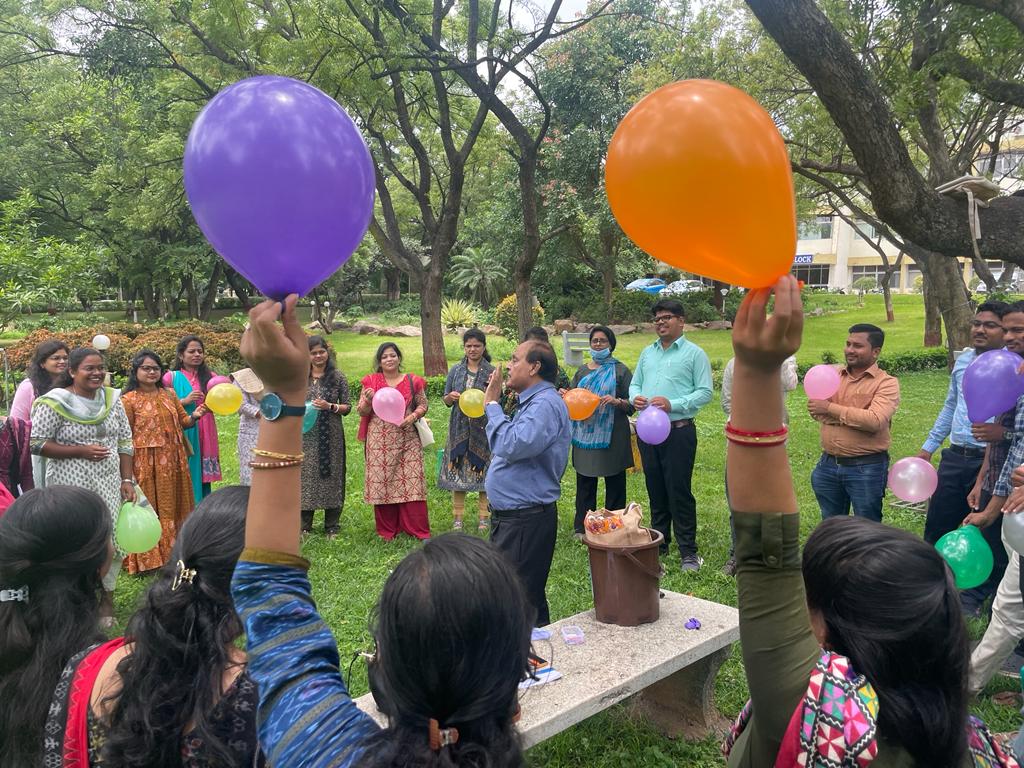
Dr Saxena took a technical session centred on problem-solving and conflict resolution, which helped participants equip the practical skills to navigate complex situations, fostering a more harmonious and productive work environment. The technical session conducted by Dr V K Reddy focused on the principles and practices of teamwork. The session emphasised effective communication, role clarity, and shared goals as vital components of successful teamwork.
Mr Dinesh Kumar, Marketing Head of ITC Aqua Foods, led a session on ‘Farmer and Market Linkage in the Fishery Sector.’ The focus was on bridging the gap between fish farmers and markets to enhance profitability and sustainability.
Dr. Ravindra S. Gavali, Head, CNRM, CC&DM conducted a session focusing on climate change adaptation within the fishery sector. Dr. Gavali emphasised the need for adaptive strategies to ensure the sector’s resilience and participants gained insights into the challenges posed by climate change and its impact on fishing.
Ms. Nagalaxmi, Senior Accountant, NIRDPR delivered an informative session covering the fundamentals of financial accounting. Her presentation delved into key topics such as balance sheets, profit and loss accounts, and fund flow and cash flow statements.
Dr. Partha Pratim Sahu, Associate Professor, NIRDPR conducted a session on ‘Promoting Entrepreneurship in the Fishery Sector.’ The session aimed to empower individuals to explore entrepreneurial opportunities in the fishery industry for sustainable development. Dr Sahu shared inspiring success stories of fishery entrepreneurs to encourage creative thinking and seizing business prospects.
Dr. Sonal Mobar Roy, Assistant Professor at NIRDPR, took a session on ‘Participatory Rural Appraisal’ for Assistant Fishery Officers. She emphasised the vital role of Participatory Rural Appraisal (PRA) specifically within the fishery sector. Dr Sonal highlighted how involving local stakeholders can lead to a more comprehensive understanding of challenges and opportunities in fisheries.
During the visit to NIRDPR’s Rural Technology Park, led by Dr. Khan, Consultant, NIRDPR, practical aspects of training, extension, and technology transfer in rural areas were explored. The focus was on hands-on training for rural communities, showcasing tailored innovations in agriculture, water management, and renewable energy solutions. Emphasis was placed on the crucial role of extension services in disseminating knowledge to farmers and villagers, bridging the gap between research institutions and rural communities.
As part of the training programme, participants visited Vangapally village of Yadadri Bhuvanagiri district, where a Participatory Rural Appraisal (PRA) exercise was conducted. Led by Dr. Ravindra S Gavali, the PRA involved activities like focus group discussions and participatory mapping. Local community members, including PRIs, SHGs, and FPOs, actively participated in the exercise that aimed to understand the community’s needs and aspirations, fostering collaboration between departments, PRIs, and the community for expanding fishery activities.

The participants further visited the Mandal Samakhya (MS), Yadadri for an insightful interaction with district-level officials. The focus was on promoting rural entrepreneurship through Self-Help Group (SHG) initiatives in farming and allied sectors. This visit provided officers with a practical understanding of grassroots-level initiatives and community-driven approaches to bolstering rural entrepreneurship.
Participants collaborated in group work to prepare a Perspective presentation in view of the Fishery Sector. They brainstormed and strategised ideas on social mobilisation and capacity building at the community level, augmentation fish production, and market linkages. Discussions also covered financial planning, technology integration, and community engagement. Each group presented their Perspective Plan, showcasing innovative solutions to enhance fish farming practices. The exercise encouraged active participation and collective thinking, fostering collaborative efforts to advance the fish farming sector. By the end of the session, participants gained valuable insights and practical ideas for improving fish farming and promoting sustainable growth in the industry.
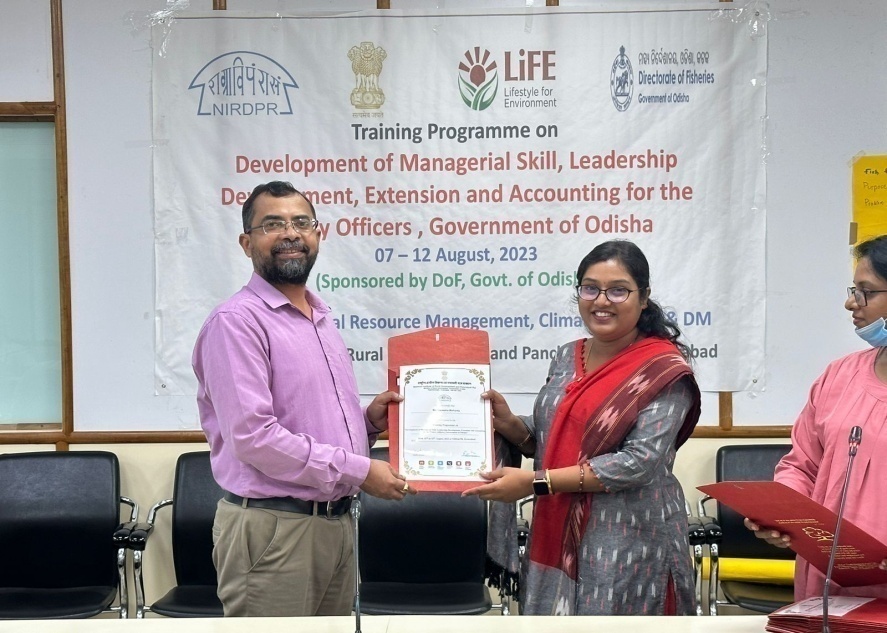
At the valedictory session, Dr. Ravindra S. Gavali, Professor appreciated the participants for their active and enthusiastic involvement. Feedback from participants was taken at the valedictory session. The evaluation of the course was done through Training Management Portal and the overall effectiveness was found to be 89 per cent.
2nd Training Programme in August
A six-day training programme on ‘Development of Managerial Skill, Leadership Development, Extension and Accounting for the Fishery Officers, Govt. of Odisha’ was organised by the Centre for Natural Resource Management, Climate Change and Disaster Mitigation from 21st to 26th August 2023. A total of 37 Assistant Fishery Officers of the Fishery Department, Odisha State attended the training programme.
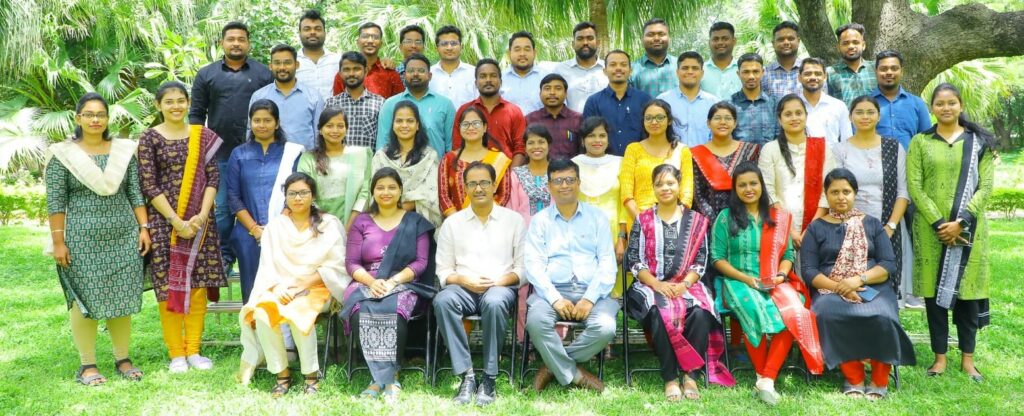
Dr. Subrat Kumar Mishra, Associate Professor, CNRMCC&DM, delivered a welcome address with a comprehensive overview of the programme and conveyed its objectives. Dr. Jyothis Sathyapalan, Professor, NIRDPR gave an insightful inaugural address, emphasising the significance of managerial skills, leadership development, and accounting in the context of Fishery Officers.
Dr. Subrat Kumar Mishra made a presentation on the ‘Salient Features of PMMSY’ and adeptly explained the integration of PMMSY with various rural development programmes to ensure the sustainability of fisheries. The convergence approach was highlighted as a strategic means to achieve comprehensive and lasting results. Participants gained insights into how PMMSY synergistically collaborates with other Development initiatives, optimising resource utilization and enhancing the overall impact on fisheries development.
Dr A. K. Saxena Professor (Retd), SVPNPA, took a session on ‘Leadership and Motivation Skills.’ He used real-life examples and activities to show how to be good leaders and motivate others in their respective sectors. He talked about different situations and explained how to handle them.
Dr. Partha Pratim Sahu, Associate Professor, NIRDPR session on ‘Promoting Entrepreneurship in the Fishery Sector’ was both enlightening and inspiring. He explained the strategies and opportunities for fostering entrepreneurship within the fishery industry. Dr. Sahu emphasised innovative ideas and practical steps, igniting a spark of creativity among the participants.
Dr. Swarnalatha Jagarlapudi (Professor, ASCI) made a presentation on ‘Managing Stress at the Workplace’. With clear explanations and relatable examples, she guided the participants through effective strategies for handling stress in their professional lives.
Dr. Sonal Mobar Roy, Assistant Professor at NIRDPR, took a session on ‘Participatory Rural Appraisal: An Extension Tool for Participatory Learning and Action. She skillfully explained how this approach empowers rural communities through inclusive involvement.
The session by Dr V. K. Reddy on ‘Principles & Practices of Teamwork’ highlighted the essential aspects of effective teamwork, emphasising communication, collaboration, and mutual respect. With practical examples, Dr. Reddy conveyed the significance of individual contributions toward achieving collective objectives.
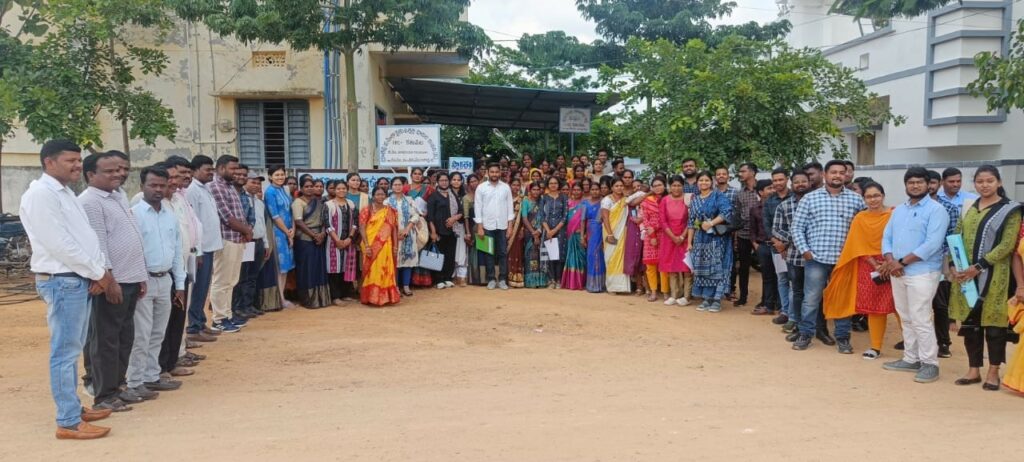
As part of the training programme, participants visited Keshampet village in Rangareddy district and a Participatory Rural Appraisal (PRA) exercise was conducted. The session involved active interaction with Self-Help Groups (SHGs) and Farmer Producer Organisations (FPOs). Through participatory methods, the community’s valuable insights on local needs, resources, and challenges were unveiled.
Dr. Saxena, in his session on ‘Problem Solving and Conflict Resolution’, delved into effective approaches for addressing challenges and resolving conflicts. Participants learned techniques to analyze problems, identify root causes, and implement solutions.
Ms. Nagalaxmi, Senior Accounts Officer of NIRDPR delivered an insightful presentation on the ‘Basics of Financial Accounting. Mr Chandru S Patil, Head of Marketing & Sales at ITC Aqua Foods Business, delivered an insightful presentation on ‘Farmer and Market Linkage in the Fishery Sector.’
Dr. Akanksha Shukla, Associate Professor, CGPS, NIRDPR took an informative session on ‘Information Dissemination and Communication Skills: Use of Local and Social Media for Dissemination of Suitable Packages and Practices.’ She showcased the power of local and social media in spreading valuable Fishery sector information.
Dr. Ravindra S. Gavali, Prof. & Head of CNRM, CC&DM delivered an informative presentation on ‘Climate Change Adaptation in the Fishery Sector.’ He discussed strategies for addressing the impacts of climate change on fisheries. Additionally, Dr. Gavali distributed a questionnaire to fishery officers, focusing on climate change adaptation.
In his presentation on ‘Integration of Fishery Sector Development Plan with GPDP’, Dr. Subrat Kumar Mishra elaborated on aligning fishery development initiatives with Gram Panchayat Development Plans (GPDP). Through practical examples, participants learned how integration could enhance local economies and resource management

The participants further visited the Kravis Aqua Farm at Balanagar to learn about the advanced Recirculating Aquaculture System (RAS). Mr. Vishwanatha Raju, MD of Kravis Aqua explained the benefits of RAS technology and its impact on sustainable aquaculture. The visit offered firsthand exposure to innovative practices, enhancing attendees’ understanding of modern aquaculture techniques. Participants collaborated in group work to prepare a Perspective presentation in view of the Fishery Sector, focusing on crafting a Perspective Plan to enhance fish farming practices.
The training program ended with a valedictory address, evaluations, and feedback. Dr Ravindra S. Gavali, delivered a closing speech, reflecting on the programme’s significance. He also distributed certificates to participants. Dr. Subrat Kumar Mishra, Associate Professor commended their eagerness to learn and engage in discussions, which significantly contributed to the programme’s effectiveness.
The Training Programme’s effectiveness was evaluated through TMP portal feedback and a post-training test, and it recorded an overall effectiveness of 90 per cent. Participants also suggested incorporating more field visits in upcoming programmes.
CWE&L, NIRDPR Offers Cluster Facilitation Project Teams Training for GIS Experts

The Centre of Wage Employment & Livelihoods, National Institute of Rural Development and Panchayati Raj conducted a three-day Cluster Facilitation Project (CFP) Teams Training for GIS Experts, at the Institute in Rajendranagar, Hyderabad, from August 01-03, 2023.
The National Institute of Rural Development and Panchayati Raj is an autonomous organisation functioning under the Ministry of Rural Development (MoRD), Government of India, and the training programme for Cluster Facilitation Project Teams working under the Mahatma Gandhi National Rural Employment Guarantee Scheme in different States under Annual Action Plan (AAP) of MGNREGA 2023-24, was conducted as per the direction of MoRD.
The MoRD started the Cluster Facilitation Teams (CFT) project in July 2014 to enhance rural livelihoods through MGNREGA in India’s 300 Blocks in Aspirational Districts and backward districts. This project aims to enhance the technical capacities to implement the programme at the Block and Gram Panchayat levels, and thereby increase the scale of MGNREGA works. These collectives have to help workers to
- Claim their MGNREGA entitlements by making them aware of the programme,
- Plan works for their village, demand work and voice their complaints in case their rights are violated,
- Reduce delays in wage payments, and
- Improve the quality of assets constructed under the programme
Therefore, to achieve the objectives of the project, Cluster Facilitation Teams (CFTs)comprising experts from the areas of Livelihoods, Natural Resource Management (NRM) and Geographical Information System (GIS) were formed in each selected Block.
It was expected that people with knowledge and experience in Integrated Natural Resource Management (INRM), civil engineering, social mobilisation and rural livelihoods at clusters of Gram Panchayats will facilitate the planning and implementation of MGNREGA. Local Civil Society Organisations, SHGs and local persons, who support the effective implementation of Mahatma Gandhi NREGA, are also the part of project.
The training programme started on 1st August 2023 with the registration of participants from Jharkhand and Odisha. A total of 24 CFPs, 15 from Jharkhand and 9 from Odisha, participated in the training programme.
Dr C. Dheeraja, Head (i/c), Centre for Wage Employment & Livelihoods inaugurated the training programme. In her opening remarks, she highlighted the primary objectives of Mahatma Gandhi NREGA, i.e. securing the livelihoods of rural people by ensuring 100 days of employment and creation of sustainable assets under the scheme.
Dr. Digambar A. Chimankar, Associate Professor & Programme Director took sessions on introduction to CFP under MGNREGA, Mahatma Gandhi NREG Act in Letter & Spirit, and explaining the MGNREG Act and guidelines in detail. Dr Ravibabu Mandala, Co-coordinator of the training programme, handled GIS sessions associated with MGNRES.

The hands-on training was also given to the CFPs at the playground on the campus. Mr. Nihar Ranjan Maharana, Department of Planning, Government of Jharkhand took sessions on Community Mobilisation for Effective Implementation of MGNREGS and CFP- Field Experiences from Jharkhand. Dr Sonal Mobar Roy, Assistant Professor discussed Gender Sensitisation under MGNREGS with the participants.
The training was conducted by Dr Digambar A. Chimankar and Dr Ravibabu Mandala with the support of Mr B Ramesh, Training Manager, Dr K. Jayasree, Junior Fellow, Dr Tandra Mondal, Research Associate, and Mr Naresh Kumar, Project Assistant-cum-Accountant.
Training Programme on MGNREGS for Inclusive Development
An inclusive society should be based on respect for all human rights and fundamental freedom, cultural and religious diversity, social justice and the special needs of vulnerable and disadvantaged groups, democratic participation and the rule of law. The concept of social inclusion is based on a subjective understanding of what is ‘right’ or ‘fair’. The government has come up with interventions for an inclusive society and these strategies are aimed to make planning and government budgeting in the country more responsive to the needs of the vulnerable sections by addressing the challenges faced by them. The inclusiveness of the Mahatma Gandhi NREGS can be understood by looking at the participation of – and employment generation for – different social groups. One of the auxiliary objectives of the Mahatma Gandhi NREGA is to empower socially disadvantaged groups such as SCs, STs and women through right-based legislation. It has been stipulated in the Act that works creating individual assets shall be prioritised on land or homesteads owned by households belonging to the SCs, STs, tribes, nomadic tribes, de-notified tribes, families below the poverty line, women-headed households, households headed by differently-abled, beneficiaries of land reforms, beneficiaries under the Indira Awaas Yojana, beneficiaries under the Scheduled Tribes and Other Traditional Forest Dwellers (Recognition of Forest Rights) Act 2006 (2 of 2007). After exhausting the eligible beneficiaries under the above categories, the lands of small or marginal farmers as defined in the Agriculture Debt Waiver and Debt Relief Scheme 2008 should be given priority.
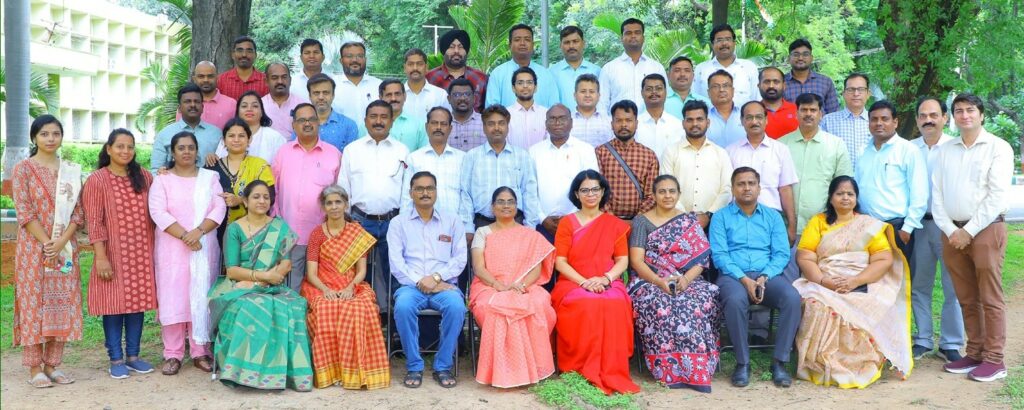
The present capacity building programme focused on the planning and implementation of Mahatma Gandhi NREGS, in terms of livelihoods, employment and inclusiveness of vulnerable groups under the programme. It aimed to elaborate different aspects of social inclusion by taking into account various kinds of assets constructed under the scheme. In this context, the Centre for Wage Employment & Livelihoods of National Institute of Rural Development and Panchayati Raj (NIRDPR), Hyderabad organised a three-day training programme on ‘Mahatma Gandhi National Rural Employment Guarantee Scheme for Inclusive Development’, from 7th – 9th August 2023 at the Institute. A total of 41 participants from thirteen states engaged in a three-day deliberation on how inclusive development can be ensured under the scheme.
The training programme aimed at effective dissemination of the Act and related guidelines to all the stakeholders and a glance at the philosophy of its inception from the perspective of democratic decentralisation and social justice.
The objectives were to sensitise the participants by enhancing their understanding of Mahatma Gandhi NREGS towards the inclusion of vulnerable groups, impart basic understanding of vulnerable groups working under Mahatma Gandhi NREGS, and focus on benefits given to the various vulnerable groups in terms of assets and employment under Mahatma Gandhi NREGS.
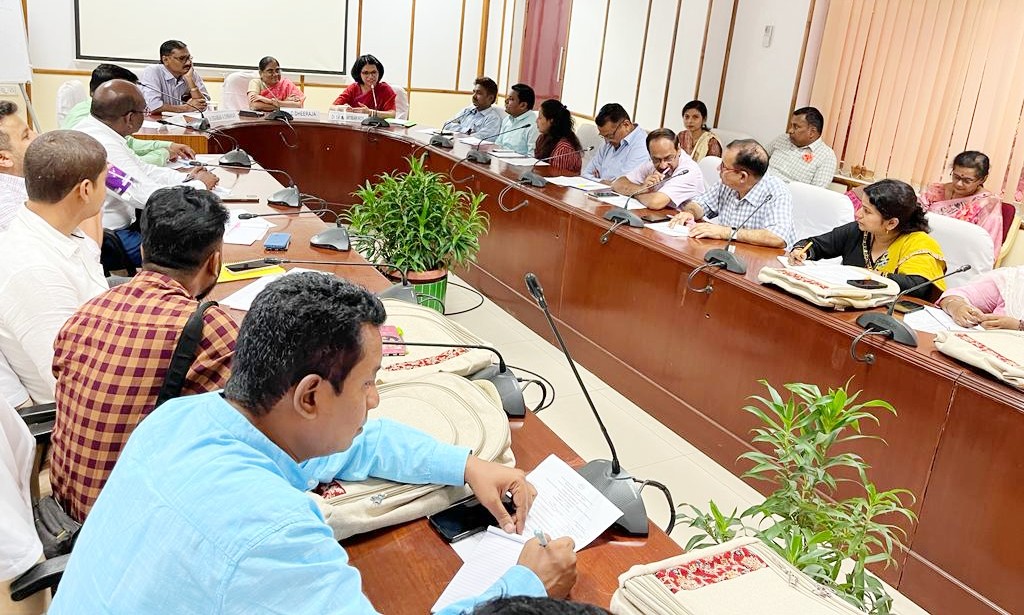
The sessions were conducted in lecture-cum-discussion mode, brainstorming, and sharing of experiences from the states. Videos were intermittently shown to sustain the interest of the participants. The programme began with a discussion on poverty and vulnerability and the pressing need to mitigate the same through inclusiveness. This was followed by deliberation on the spirit of inclusivity as upheld by the Mahatma Gandhi National Rural Employment Guarantee Scheme. Session on Project Unnati then dealt with the need to enhance livelihoods through skill development. This was followed by a discussion on the identification of works under the Mahatma Gandhi NREGS wherein focus was drawn for special category works for the vulnerable people. The second day saw a stimulating discussion on gender sensitisation and issues and challenges faced by the PVTGs. Preparation of labour budget was discussed in detail with a key focus on how it can be made even more inclusive in nature.
The last day of the training programme saw a discussion on promoting entrepreneurship for the most marginalised and vulnerable people with inclusive development and ways in which their livelihoods can be sustained. Localising SDGs through the convergence of Mahatma Gandhi NREGA with other development interventions was quite engaging. The training programme concluded with a glimpse of the performance of the scheme towards vulnerable groups with respect to inclusiveness which was critically discussed and deliberated upon.
The programme was well-received by the participants who expressed that it was a neglected domain that needed to be addressed. They felt that the discussions majorly on the vulnerable sections were very invigorating and they cherished the dialogues that took place during the three days. The training program was coordinated by Dr Sonal Mobar Roy, Assistant Professor and Dr Digambar A. Chimankar, Associate Professor, Centre for Wage Employment and Livelihoods.
ToTs on GIS-based Planning and Monitoring of MGNREGA at GP level Using Yuktdhara
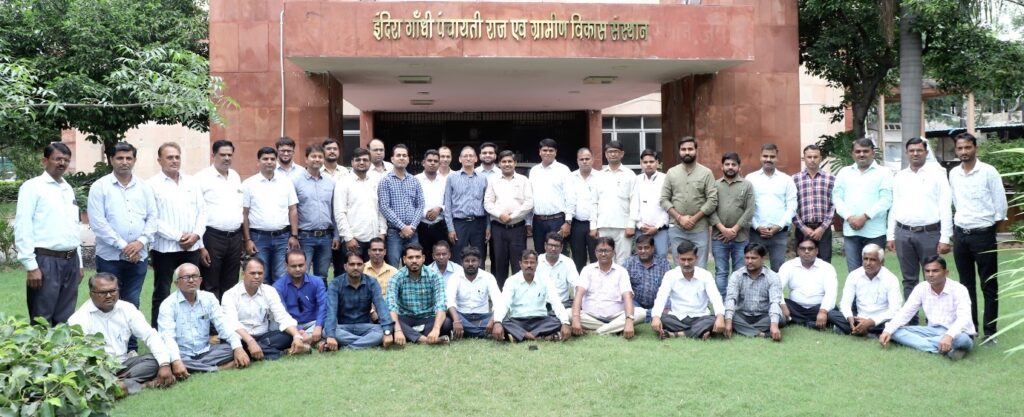
Two 3-day Training of Trainers Programmes on GIS-based Planning and Monitoring of Mahatma Gandhi NREGA at GP level using Yuktdhara were organised at Indira Gandhi Panchayati Raj & Gramin Vikas Sansthan (IGPR&GVS), Rajasthan from 31 July- 02 August 2023 and 03-05 August 2023.
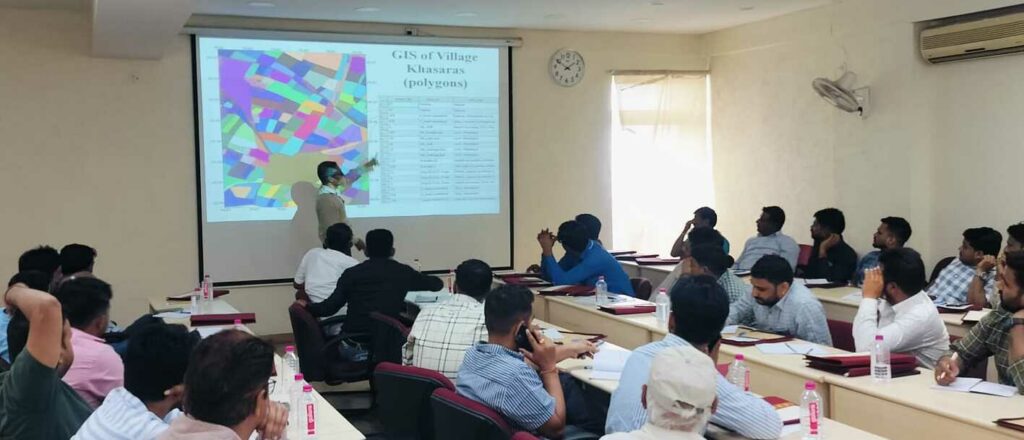
The programmes sponsored by the MGNREGA Division of MoRD were mainly organised for engineers and officials working as BTRTs in NREGA. In each programme, 40 participants from various Blocks of Rajasthan participated. On average, two JTAs & MIS Managers working under MGNREGA attended the programme.
The first day covered topics such as Introduction to Geoinformatics and its Applications in Planning & Monitoring of MGNREGA, Ridge to Valley Concept and Watershed in Context of MGNREGA, and Introduction to Yuktdhara –A Geospatial Application for Planning and Monitoring of MGNREGA, besides a demonstration of Yuktdhara.
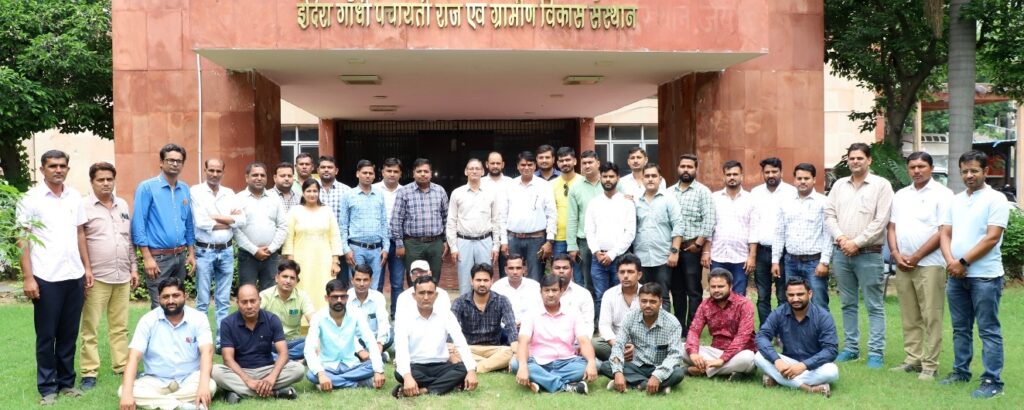
On the second day, topics including INRM Planning under MGNREGS: Geospatial Approach, Hands-on Session on Yuktdhara for Landscape Familiarisation & Identifying Drainage Line Treatment, Hands-on Session on Yuktdhara for Identifying Area Treatment & Map composition were covered. State-level officials of MGNREGA handled sessions on NGREGASoft, MIS: Clarifications and discussions; State monitoring strategy through Secure app, etc.
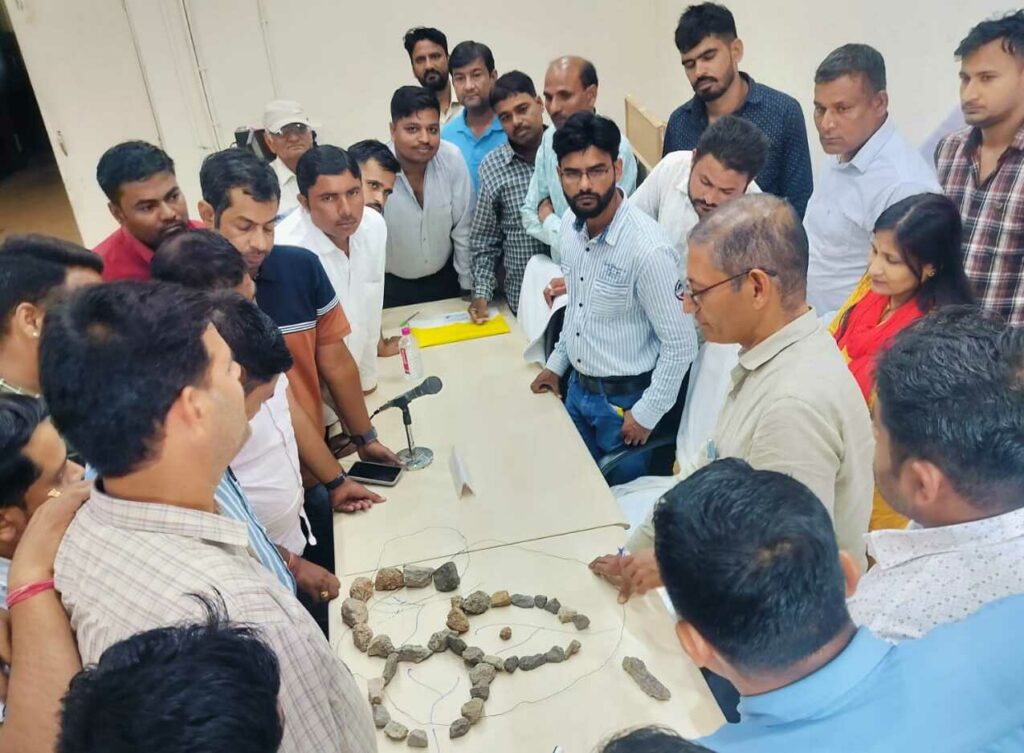
On the third day, a session on Introduction to Preparation of GP Plans under MGNREGA using Yuktdhara was followed by a hands-on session on the preparation of GP Plans under MGNREGA using Yuktdhara, and the review and clarifications of GP plans prepared. In this session, companion members from blocks presented the plans prepared for their selected district.
The overall feedback for the first and second ToTs are 94 per cent and 96 per cent, respectively. Shri H. K. Solanki, Sr. Assistant Professor, CRI, NIRDPR coordinated the course with the support of Shri Ramavatar Meena, Associate Professor & Joint Director, IGPR&GVS and Ms R. L. Sudha, Training Associate, CRI and under the overall supervision and guidance of Dr P. Kesava Rao, Head, CGARD, NIRDPR.
Members of All India Senior Citizens Confederation Visits NIRDPR
The members of All India Senior Citizens Confederation visited the National Institute of Rural Development and Panchayati Raj on 8th August 2023. They interacted with Dr G. Narendra Kumar, IAS, Director General, NIRDPR, on policies, programmes, CSR funding to the senior citizens’ livelihood activities and their status of implementation.
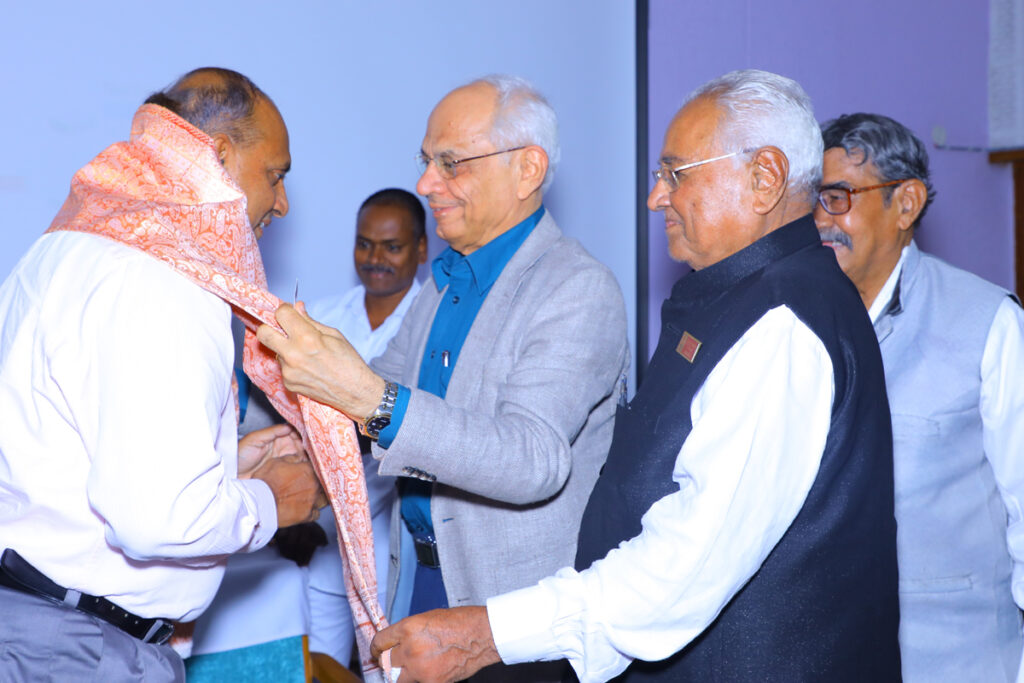
During the interaction, the Director General opined that elders are untapped valuable human resources, and added that a policy on ‘Care for Senior Citizens’ was framed while he was serving in NCT of Delhi.
“The policy envisages ensuring the welfare of senior citizens and improving the quality of their lives by providing facilities for care, recreation and all-round development. It aims to offer assistance for enabling them to cope with the problems of old age, and also proposes affirmative action by the government departments to ensure that the existing public services for senior citizens are made more user-friendly and sensitive to their needs. The policy emphasises on recognition of senior citizens as valuable human resources worthy of respect with a legitimate place in society. Focusing on ‘silver economy’, i.e. the capabilities of senior citizens for contribution to the nation building and the betterment of society, it aims all possible help to senior citizens to live with purpose, peace and dignity,” he said.
The DG stated that the involvement of individuals, families, society, welfare associations and NGOs is pertinent for implementing the policy and achieving satisfactory results.
“Ageing is a global trend of our time and demographic transition is very fast in China, Japan, European countries and America. In fact, people are living longer, and more are older than ever before. According to data available, in 2019, among 753 elders, there are about 90 crore elderly in the world. At present, there are approximately 14 crore (10 per cent) elderly citizens in India. The number of persons aged 65 years and above will reach 1.6 billion in 2050, and account for more than 16 per cent of the global population. The number of people aged 80 years and above is growing even faster. Spectacular improvements in health and survival and reductions in fertility have driven this demographic shift,” Dr Narendra Kumar said.
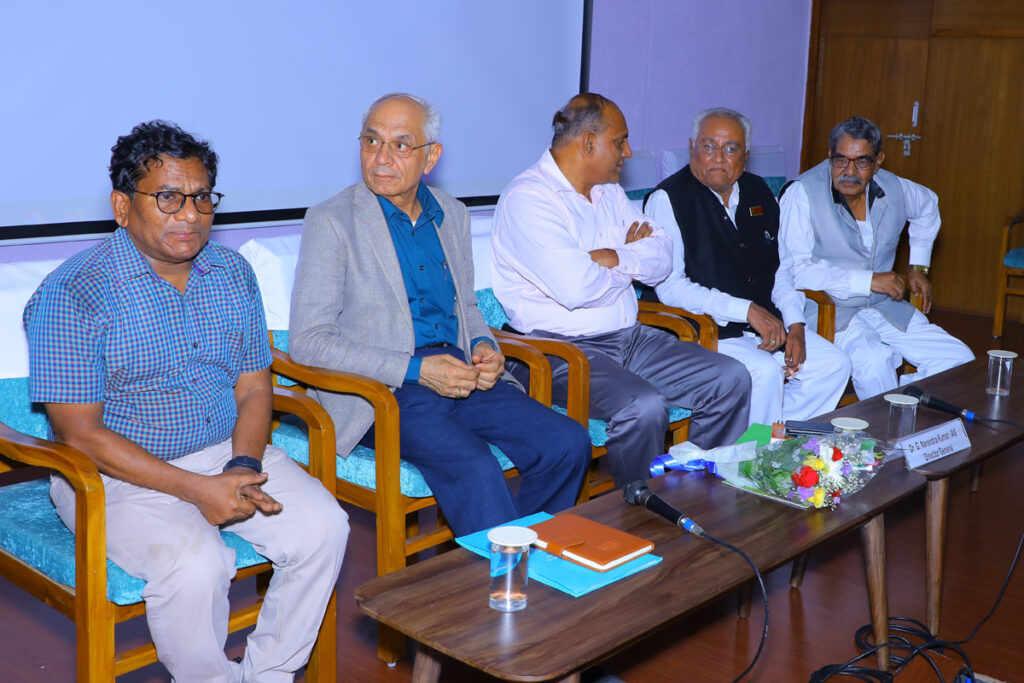
“The main lacuna in policy is the lack of geriatric care in public hospitals. In India, geriatric care is in the very initial stages, whereas geriatrics in public health is limited in rural areas. In India, there is no system of affordable healthcare and health insurance is essentially limited to hospitalization. Lack of health infrastructure and skilled manpower to cater to the needs of the elderly, and poor quality of care are main concerns in rural areas,” he said.
‘The rise in longevity is a success story. However, the objectives of policies should enable elderly persons to remain productive and empowered members of society. As the age grows, the senior citizens experience various anatomical and psychological changes. NITI Aayog observes that elderly people battle feelings of powerlessness, inferiority, depression, uselessness, and reduced competence. They are worried about loneliness, which isolates them from rest of the society. Negligence by the children and the young people, and dependency on children for finances and mobility add to their woes. Factors such as disintegration of the joint family system, and migration of young generation to the urban areas and abroad have made the elderly vulnerable,’ he observed.
In response, the Members of All India Senior Citizens Confederation suggested emulating Vietnam-like measures by creating SHGs with a blend of young and elderly people. They opined that SHGs with 30 per cent youngsters and 70 per cent elderly could help the participation of senior citizens in economic activities.
TOLIC – 2 Organises Hindi Technical Workshop at ICAR-IIOR
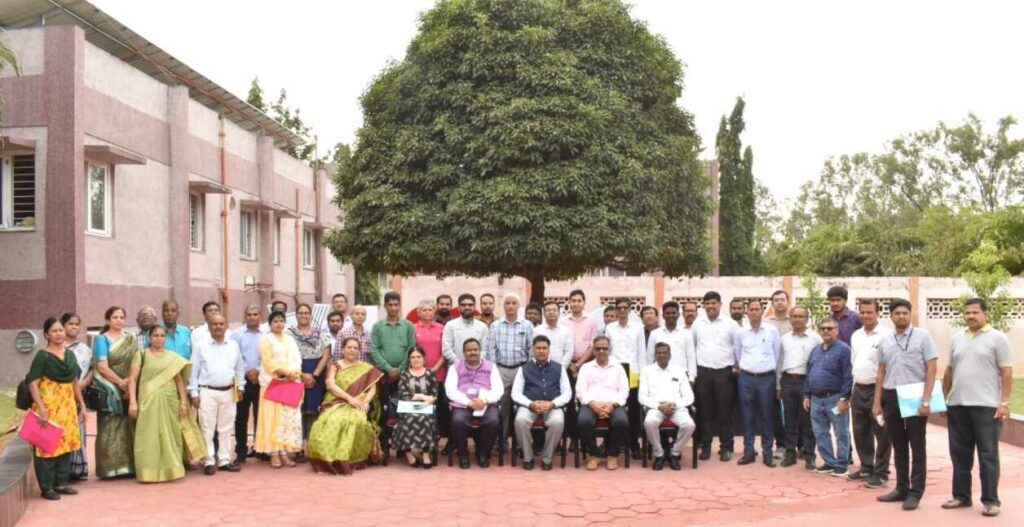
A Technical Hindi Workshop was organised under the aegis of the Town Official Language Implementation Committee (TOLIC – 2) at ICAR-IIOR (Indian Institute of Oilseeds Research), Rajendranagar, Hyderabad, on 24th August 2023.
Dr R. K. Mathur, Director, Indian Institute of Oilseeds Research presided over the programme. Dr. Vinod Kumar Singh, Director, CRIDA was the chief guest of the workshop.
Dr Hariprakash Meena, Scientist, ICAR-IIOR delivered the welcome address. Smt. Anita Pandey, Assistant Director (Official Language) and Member Secretary, Town Official Language Implementation Committee, presented the outline of the workshop.
Dr R. K. Mathur, during his address, talked about the initiatives being taken by the Institute regarding the implementation of the official language. “Unless all staff do their work in Hindi, it is not possible to adopt the official language in the true sense,” he said.
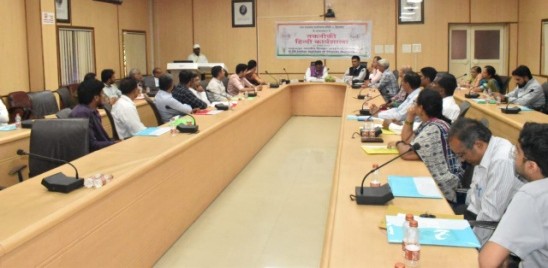
Chief Guest Dr. Vinod Kumar Singh, Director, CRIDA also shared his experiences on how the translated material in Hindi language is being circulated globally. He pointed out that the conclusions that emerged in the two World Climate Change Conferences were circulated in Hindi as well. He added that the learners should develop a keenness towards Hindi to become proficient.
Dr. Pradyuman Yadav, Senior Scientist, Indian Institute of Oilseeds Research delivered a lecture in Hindi on ‘Edible Oils and Myths related to them.’ Using slides, he gave a detailed presentation about different types of edible oil and their uses, omega-3 fatty acids, etc. Apart from this, the participants visited the oilseed research laboratories to learn about oilseed processing.
In total, 49 officers and employees from various Central government offices attended the workshop. Dr. Pradeep Singh, Assistant Director (Official Language) proposed a vote of thanks. Shri E. Ramesh, Senior Hindi Translator and OL staff of NIRDPR assisted in the conduct of this workshop.
NIRDPR Observes Organ Donation Day
As part of the ‘Angdaan Mahotsav’ awareness campaign kick-started in line with the Azaadi ka Amrit Mahotsav to commemorate 75 years of Independence of India, the National Institute of Rural Development and Panchayati Raj, Rajendranagar, Hyderabad observed the Indian Organ Donation Day on 03rd August 2023.
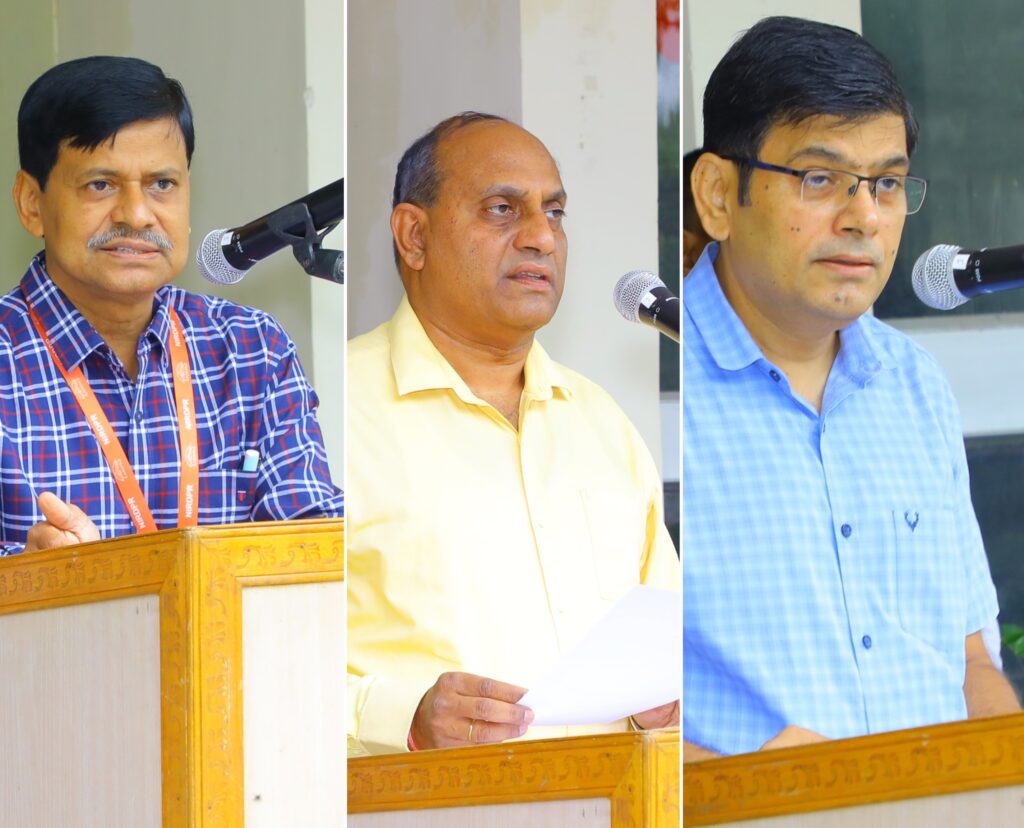
All officials of NIRDPR, participants attending various training programmes, project & contractual staff and SHG members took part in the event organised in front of Dr B. R. Ambedkar Block on the campus.
Dr Pranab Kumar Ghosh, Assistant Registrar (Training), NIRDPR welcomed the participants and highlighted the importance of the day. Dr G. Narendra Kumar, IAS, Director General, NIRDPR administered the Organ Donation Pledge in English and Shri Manoj Kumar, Registrar and Director (Admn), NIRDPR administered the pledge in Hindi.
Workshop on Implementation Framework of Mahatma Gandhi National Rural Employment Guarantee Scheme
The Centre for Wage Employment and Livelihoods (CWE&L) organised a one-day workshop titled ‘Implementation Framework of Mahatma Gandhi National Rural Employment Guarantee Scheme’ at the National Institute of Rural Development and Panchayati Raj, Hyderabad, on 24th August 2023.
The workshop brought together stakeholders, policymakers, experts, and practitioners to deliberate on critical issues related to the implementation framework of Mahatma Gandhi NREGS and identify ideas to enhance its effectiveness, efficiency, and impact. There was representation from eight States and the participants shared their viewpoints and brainstormed on re-thinking the framework. The resource persons who laid the roadmap for discussion for various sessions included Dr Jyothis Sathyapalan, Professor & Head, CPGS&DE and CDC, Dr. C. Dheeraja, Associate Professor & Head, CWE&L, Dr. Subrat Kumar Mishra, Associate Professor, CNRM, CC&DM, Dr. P.P. Sahu, Associate Professor & Head, CEDFI and CGG&PA, and Dr Sonal Mobar Roy, Assistant Professor, CWE&L.
It was felt that the implementation framework of the scheme needs to be relooked at. Hence, the workshop was planned with specific objectives to deliberate upon. The discussants were expected to brainstorm on the following issues:
(i) Review of Current Implementation: Assess the strengths and weaknesses of the current implementation framework of Mahatma Gandhi NREGS, considering both success stories and challenges faced at the grassroots level.
(ii) Addressing Socio-economic Inequalities: Explore ways to target the most marginalised and vulnerable communities to bridge socio-economic gaps and empower them through Mahatma Gandhi NREGS.
(iii) Skill Development and Capacity Building: Examine strategies to integrate skill development and capacity-building programmes into Mahatma Gandhi NREGS to equip rural workers with improved employability and sustainable livelihood opportunities.
(iv) Climate Resilience and Natural Resource Management: Deliberate on the integration of climate-resilient practices and effective management of natural resources in Mahatma Gandhi NREGS projects to promote sustainable rural development.
(v) Enhancing Accountability and Transparency: Discuss mechanisms to ensure transparency, accountability, and proper governance in Mahatma Gandhi NREGS, including robust monitoring systems and citizen participation.
(vi) Innovative Technologies and Digital Inclusion: Discuss the potential of leveraging modern technologies and digital platforms to streamline processes, reduce delays, and enhance outreach in the implementation of Mahatma Gandhi NREGS.
Moreover, the workshop also aimed at addressing further critical issues such as:
(a) Delayed Wage Payments: Addressing the persistent issue of delayed wage payments to ensure timely remuneration and prevent financial hardships for rural workers.
(b) Administrative Bottlenecks: Identifying administrative challenges and streamlining procedures to expedite project approvals and implementation.
(c) Leakages and Corruption: Developing effective measures to curb leakages and corruption in the allocation and execution of Mahatma Gandhi NREGS projects.
(d) Gender Social Inclusivity: Analysing the gender-specific constraints and designing strategies to promote women’s participation and empower them through the scheme.
(e) Convergence with Other Schemes: Exploring opportunities for synergy and convergence between Mahatma Gandhi NREGS and other rural development schemes to maximise impact and resource utilisation.
(f) Monitoring and Evaluation: Strengthening monitoring and evaluation mechanisms to assess the scheme’s outcomes and identify areas for improvement.
In light of the above, ways to encourage community involvement in project planning and implementation to ensure projects align with local needs and priorities were discussed. The discussions highlighted the importance of implementing technology-driven solutions like geo-tagging of assets and conducting regular social audits to promote transparency and accountability. While discussing Natural Resource Management, ways to integrate projects that focus on sustainable livelihoods, such as water conservation, afforestation, and renewable energy, to create long-term benefits for rural communities were explored. The importance of Digital Literacy and Financial Inclusion to empower rural workers and promote access to formal financial services was examined.
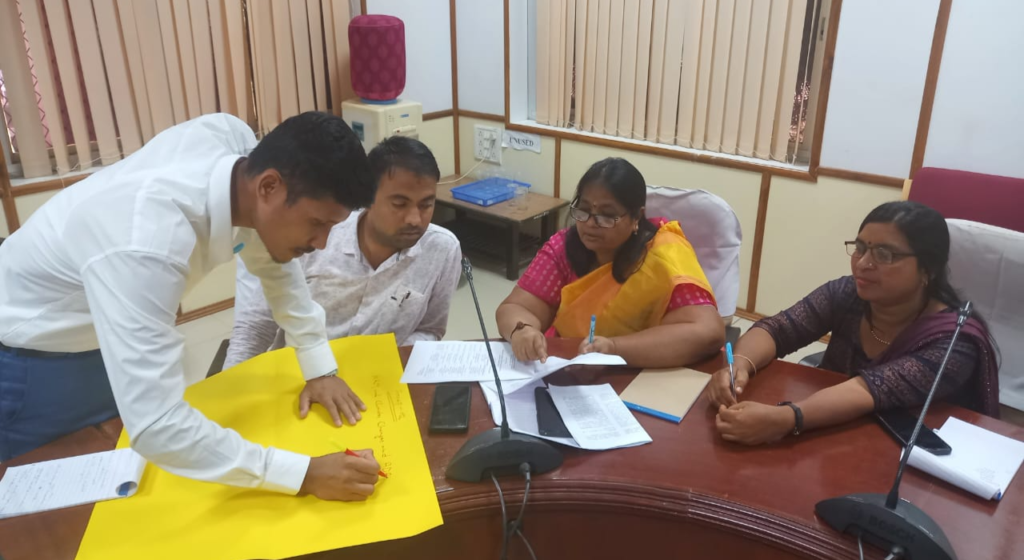
The workshop had deliberations divided into four main themes which included (i) whether we are moving out of poverty, (ii) NRM and climate change, (ii) whether technology is a boon or bane in Mahatma Gandhi NREGS, and (iv) good governance practices in Mahatma Gandhi NREGS. Following the deliberations, the groups were divided to brainstorm and come up with recommendations. Their recommendations included the need for a more efficient and focused approach to poverty eradication along with climate change adaptation. The importance of convergence among various programmes and schemes, with a focus on strengthening local governance (PRI) was highlighted. The role of technology for transparency, enhancing the capacity of stakeholders, and ensuring good governance for better implementation of Mahatma Gandhi NREGS was also discussed. The session came up with suggestions for policy intervention focused on marginalised groups and emphasised the need for periodic assessments and accountability measures to bridge the gap between the privileged and underprivileged.
The workshop on ‘Implementation Framework of Mahatma Gandhi National Rural Employment Guarantee Scheme’ sought to provide a platform for diverse stakeholders to share insights, best practices, and innovative ideas. By collectively addressing critical issues and exploring new strategies, the workshop aimed to contribute to the sustainable and equitable growth of rural India through the effective implementation of Mahatma Gandhi NREGS. The workshop was coordinated by Dr. Sonal Mobar Roy, Assistant Professor and Dr. C. Dheeraja, Associate Professor & Head, CWE&L.
Training-cum-Exposure Visit to Best Practices and Cross-Learning Programmes under MGNREGS in Kerala
The Centre for Wage Employment and Livelihoods (CWE&L) organised a training–cum-exposure visit to Best Practices and Cross-Learning Programmes under Mahatma Gandhi NREGS in Kerala State. Senior State-level officials working with Mahatma Gandhi NREGS Programme implementation from Andhra Pradesh, Chhattisgarh, Gujarat, Jharkhand, Karnataka, Maharashtra, Odisha and Tamil Nadu attended the programme conducted at the Centre for Human Resource Development (CHRD) of Kerala Institute of Local Administration (KILA) in Kottarakkara, Kerala.
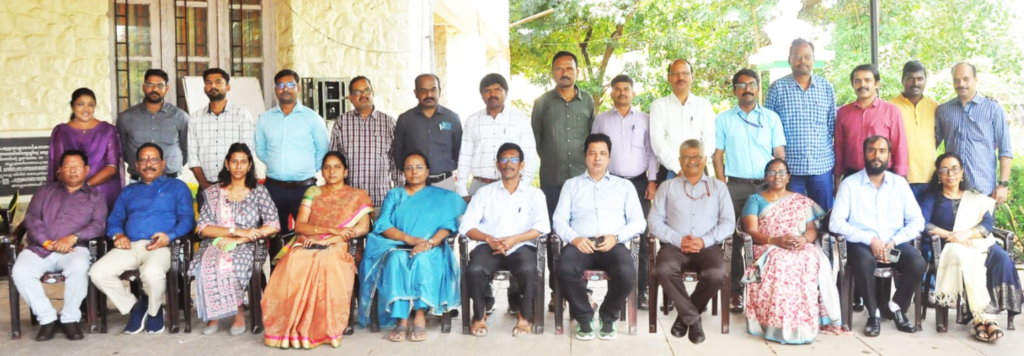
The programme was inaugurated by Smt. D. Sudha, Director, CHRD-KILA, Shri A. Nisamuddin IAS, Director, MGNREGS, Kerala and Shri P. Balachandran Nair, Joint Director, MGNREGS, Kerala. The course design was briefly presented by Dr Raj Kumar Pammi, Course Director & Assistant Professor, CWE&L, NIRDPR along with Shri C. Vinod Kumar, Faculty member and Local Course Director, CHRD-KILA, Kottarakkara.
The three-day programme comprised in-house sessions and field visits to best practices of MGNREGS in Kerala with the support of MGNREGS officials at various levels. The first day of the programme started with the introduction and overview of training cum exposure visits to best practices of other States by the programme director. This was followed by a detailed presentation by the State Director and Joint Director of Kerala State Mahatma Gandhi NREGS on Kerala’s initiatives/best practices under Mahatma Gandhi NREGS.
The participants were introduced to Kerala’s initiatives during the field visits to various Blocks of Kollam and Thiruvananthapuram districts. The participants interacted with NREGS wage seekers at the worksite during the field visits to various Gram Panchayats. They also visited the Block and GP offices to see the reports and documentation procedures. The Block level officials of Kollam district explained the innovative initiatives taken up. The participants visited various works taken up under MGNREGS such as Anganwadi centre, tailoring unit, kitchen shed, school toilet complex, Category B Assets, NRM works, plantation works, farm ponds, Amrit Sarovars, block plantation, playgrounds, earthen bunds, goat shelters, Azolla tanks, SHG worksheds, CIB unit, school dining hall, soil and water conservation works, UIT road connectivity, compost pits, well recharge and afforestation activities in Kollam and Thiruvananthapuram districts.
On the last day, the participants made presentations of the important works and innovative practices of their respective States. In the valedictory session, the participants said that the programme helped to better their knowledge and improved their skills in planning and execution of innovative works of MGNREGS. Furthermore, they said they would replicate the best practices in the back-home situation.
The programme was coordinated by Dr Raj Kumar Pammi, Assistant Professor, Centre Wage Employment and Livelihoods (CWE&L), NIRDPR and Shri C. Vinod Kumar, Faculty, CHRD-KILA, Kottarakkara, Kerala.
ToT Programme on Marketing Skills for SRLM Officials at CGC, Vaishali
The Centre for Marketing & Promotion of Rural Products & Entrepreneurship Development (CMPRPED), NIRDPR Delhi Branch organised a 3-day Training of Trainers (ToTs) Programme on Marketing Skills for SRLM Officials of Bihar, Jharkhand and Uttar Pradesh at the Consultancy-cum-Guidance Centre (CGC) on NIRDPR Campus, Vaishali, Bihar, from 22nd to 24th August 2023. Thirty-eight participants from three States participated in the programme.

The objectives of the training programme were to (i) discuss issues and challenges in marketing rural products, (ii) impart the latest marketing skills, appropriate to overcome the Challenges, and (iii) orient the participants to adopt best practices through exposure visits. The training courses were designed by the Centre in consultation with experts from the National Institute of Fashion Technology (NIFT), Indian Institute of Mass Communication (IIMC), Indian Institute of Packaging, etc.

Dr G. Narendra Kumar, IAS, Director General, NIRDPR inaugurated the programme by lighting the lamp. Shri Chiranji Lal, Assistant Director (CMPRPED), NIRDPR Delhi Branch, delivered the welcome note and Dr Ruchira Bhattacharya, Assistant Professor & Head, NIRDPR Delhi Branch gave the opening remarks.
Dr G. Narendra Kumar, Director General, NIRDPR delivered the keynote address. He gave a detailed presentation on the key findings of the study titled ‘In Search of Excellence in Rural Transformation: The Mann ki Baat Stories’ conducted by NIRDPR. The Director General also explained the key elements of marketing plan.
The 3-day programme comprised the following sessions:
Systematic Training Methods on Marketing Skills – Dr Ruchira Bhattacharya, Assistant Professor, NIRDPR, Delhi Branch; Sales Communication and Psychology of Buyers, Behavioural Changes – Shri Chiranji Lal, AD, NIRDPR, Delhi Branch; Issues and Challenges in Marketing of Rural Products (Group Exercise) – Dr Ruchira Bhattacharya, Assistant Professor, NIRDPR, Delhi Branch; Branding, Better Designing & Packaging of Rural Products – Shri Shakti Sagar Katre, Assistant Professor, NIFT, New Delhi; Group exercise to prepare a Marketing Plan – Dr Ruchira Bhattacharya, Assistant Professor, NIRDPR, Delhi Branch; Group Presentations on Marketing Plan- Dr Ruchira Bhattacharya, Assistant Professor, NIRDPR, Delhi Branch; and Taxes/GST Issues – Dr Ajit Kumar, NRP Financial Inclusion.

The participants also visited Padma Shri awardee Smt. Rajkumari (Kisan Chachi) in Anandapur village of Muzaffarpur district in Bihar. The visit was planned to orient the participants about the operational model of her SHG, marketing strategy, visual merchandising, branding and packaging and best practices adopted by them.
The programme received positive feedback from the participants and esteemed speakers. As per the feedback from the participants taken via Training Management Portal, the programme registered an overall effectiveness of 74 per cent.
Shri Shashi Bhushan, former Financial Advisor/Deputy Director General (i/c), NIRDPR, and Shri M.D. Khan, Senior Consultant, NIRDPR also attended. Course Director Shri Chiranji Lal Assistant Director (CMPRPED), Delhi Branch coordinated the training programme with the support of Dr Ruchira Bhattacharya, Head, Delhi Branch and officials of CMPRPED, Delhi Branch.
ToT Programme on Tools and Techniques for Good Governance in Public Service Delivery
The National Institute of Rural Development and Panchayat Raj (NIRDPR) organised a four-day Training of Trainers (ToT) Programme on ‘Tools and Techniques for Good Governance in Public Service Delivery – Ensuring Transparency and Accountability’ from 22nd – 25th August 2023, on its Hyderabad campus. A total of 31 participants comprising Rural Development officials, Mahatma Gandhi National Fellows, Researchers, NGO members, Government Officials, and Public Policy experts participated.
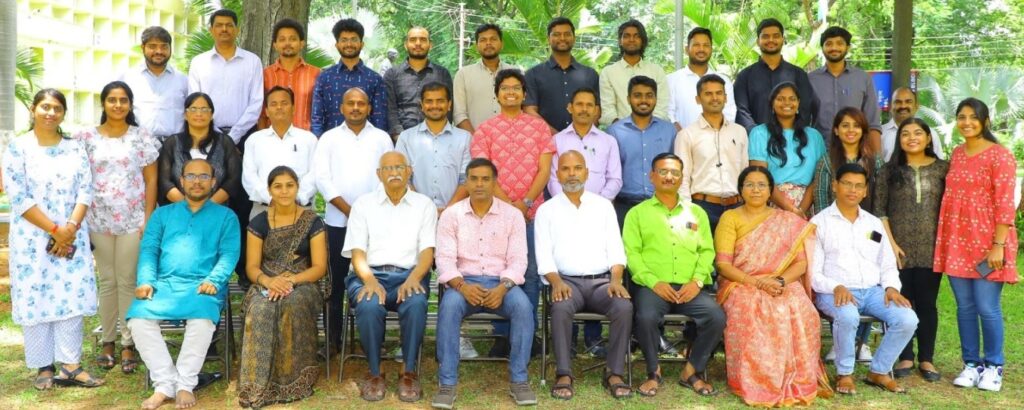
The core objectives of training were to understand i) Core issues and challenges in public service delivery, ii) Meaning of Government, Governance, Good Governance, e-Governance and ICT, iii) Community Score Card, Citizen report card, Public expenditure tracking, Budget analysis with case studies, best practices, and iv) Group activity on Tools and techniques to ensure effective, transparent and accountable public policy delivery for of Good Governance to manage National affairs for Nation building.
This training programme was designed to enhance the skills of participants through practical sessions on tools like Community Score Card, Citizen Report Card, group discussions, leadership skills development and presentations.
The first day started with an introductory session and a pre-evaluation to check the participants’ understanding of Good Governance. Further, Course Director Dr K. Prabhakar introduced the basics of Government, Governance and Good Governance.
The second session delivered by K. Rajeshwar, Assistant Professor, CGGPA, covered the topic ‘ICT – Tools for Transparency and Accountability.’ He introduced the concepts of Governance, Good Governance, and e–Governance, Digital India, and Mission Mode Projects.
On the second day, the first session started with a discussion of ‘Budget Structure and Analysis’ delivered by the Course Director. This session offered deep insight into the fiscal structure in India, fund flow mechanism, analysis of priorities of the government, need for analysing the budget, inspection of allocations and expenditures, and examination of the progressivity of resource mobilisation policies of the government. The second session on Transparency and Accountability Tool – Community Score Card (CSC) was also delivered by the Course Director.
The participants visited the Rural Technology Park on the campus to gain knowledge about various initiatives, skill development for rural areas, employment opportunities, etc.
On the third day, Course Director Dr K. Prabhakar introduced Public Expenditure Tracking Surveys (PETS). In the next session, he presented the Citizen Report Card, followed by a Group Activity on Practice on Citizen Report Card.
In the first session of the final day, the Course Director introduced Good Governance in Supply-side public service delivery – FMA and SET Approach besides discussing PMAY policy analysis in detail. The second session saw a presentation and group activity on CRC Report. The participants, in five groups, presented CRC reports with questionnaires, followed by a question and answer session.
In the valedictory session, the participants shared their views on skill sets adopted and new learnings. They elaborated on how they could utilise the tools in their programmes, and how the training would help them bring policy performance, research findings, and budget analysis. They said the USP of the programme was the hands-on session on using Good Governance tools. The participants added that the programme trained them to effectively utilise the tools and techniques for Good Governance in public service delivery.
The programme was coordinated by Dr K. Prabhakar, Assistant Professor, Centre for Good Governance and Policy Analysis (CGG&PA), NIRDPR.
(Note: This report is prepared by a participant Mrs. Ankita Jadhav (Project Councilor, Sakhi One Stop Centre) and Mr Nikhil S Dhage, Project Manager Sane Guruji Foundation for Educational Cultural & Rural Development Research, Amalner, Jalgaon, Maharashtra)
NIRDPR-NERC Organises Training Programme on Strategies for Planning and Implementation of Carbon-Neutral Villages
The National Institute of Rural Development and Panchayati Raj, North Eastern Regional Centre (Ministry of Rural Development, Govt. of India), Guwahati (NIRDPR – NERC), Assam and State Institute of Rural Development (SIRD), Meghalaya, Nongsder, jointly organised a 5-day regional off-campus training programme on ‘Strategies for Planning and Implementation of Carbon Neutral Villages’ from 8th – 12th May 2023 to address India’s performance on climate action. Officials representing the Departments of Agriculture, Horticulture, Forestry, Fisheries, Rural Development, State Biodiversity Boards, Meghalaya Basin Development Agency and other organisations drawn from Assam, Meghalaya and Mizoram participated in the programme to deliberate on the Biodiversity Act, its institutional mechanism for implementation, and roles and responsibilities of Biodiversity Management Committee (BMC) for good governance at local village institution level.

Dr V. Suresh Babu, Associate Professor, NIRDPR-NERC & Programme Director, developed and designed this training module. The objective was to create a pool of employees, who can generate awareness among the village communities and support the BMC by emphasising access and benefit-sharing provisions, preparing PBR (People’s Biodiversity Register), estimation of carbon emission, sequestration process and sink, marketing carbon credits and enhancement of biodiversity through holistic approaches of the rural development flagship programmes, including Centrally sponsored line department schemes for augmenting afforestation, biodiversity and livelihood opportunities of tribal rural households.
Delivering the welcome address, Dr. V. Suresh Babu laid focus on the Climate Change Performance Index (CCPI). “India’s performance on climate action has been rated as ‘high’ in the GHG emissions, energy use and climate policy categories, ‘medium’ in renewable energy, and is already on track to meet its 2030 emissions target aligned to a well-below ‘2OC scenario’. India made further progress towards a 1.5OC future at COP26, declaring an intent to achieve net-zero emissions by 2070 to achieve a five-fold strategy, termed as the Panchamitra commitments, to reduce shortages of water, food and greater health risks,” he said.
Dr. D. Evanoreen Ann Khongwir, Scientist, Meghalaya Biodiversity Board (MBB) presented an interactive session on the People’s Biodiversity Register (PBR) and a detailed case study of Khweng BMC covering seven PBR formats. Dr S. Dey, Senior Technical Officer, Meghalaya Biodiversity Board delivered a lecture on access and benefit-sharing provisions for facilitating the village households and village councils with economic benefits and respective shares.

In continuation, participants were introduced to the National Bamboo Mission for biodiversity conservation which centres on the promotion of bamboo in degraded lands/scrub forests to sequester maximum carbon and accelerate the rural livelihood and economy through value addition. Agroforestry models, criteria for selection of agroforestry tree species, types of agroforestry models, merits and demerits were discussed at length.
Shri Sanwar Mal Swami, IFS, Silviculture Division, Meghalaya Forest Division, addressed the participants on the topic of Forest Department Initiatives to reduce carbon emissions. Dr. Vincent. T. Darlong, Director, delivered a lecture on ‘Promotion of Common Property Resources for Biodiversity Conservation’ by referring to the role of GPDP in the holistic planning for CPR’s conservation across the country.
As part of exposure visits, the participants visited the Community Village Forests in Sohra, Umdiengpoh, and the home-based nursery at Laitthemlangsah as well as the Assisted Natural Regeneration in Dympep village site managed by the community with the technical support extended by Khasi Hills Community REDD+ Project. They further visited the Mawphlang Sacred Groves, which is a carbon sink protected by the concept of local indigenous tribal divinity.
Mr. Felix Pde, Forestry Team Leader, shared his rich experiences on carbon emissions, carbon sequestration and sink to develop carbon-neutral villages. Mrs. Anne P Lyngdoh, Project Associate elaborated on the estimation of carbon emission and carbon sequestration. Mr. Khrawborlang Lyngdoh, Sr. Accountant, discussed the aspects of promotion and marketing strategies for carbon credit trading. Mr Kenneth B. Kharsyntiew, Tourism Development Specialist, spoke about the opportunities for eco-tourism in REDD+ organisations.
The programme concluded with the closing ceremony on 12th May 2023. The regional training programme was locally coordinated by Mr Nicholas Rynjah and Ms Elizabeth Thma, Faculties of SIRD Meghalaya and Mr Tambor Lyngdoh, Founder Chairman (Synjuk), Chief Community Facilitator cum Project Director, Khasi Hills Community REDD+ Project.
Further, for wider dissemination of knowledge on carbon-neutral villages, a similar programme was conducted by NIRDPR- NERC in collaboration with SIRD Meghalaya on 9th -11th August 2023 on the SIRD Meghalaya Nongsder campus.
Outcomes:
A participant visited Dujong Songma village in Bajengdoba C&RD Block of North Garo Hills district, Meghalaya, to hold discussions on identifying areas for forest conservation and reduction of carbon emission. The talks were held with the nokma (village headman) in the presence of villagers.
Another participant held a brief discussion with residents of villages under Wapung Community and Rural Development Block, namely Cham Cham, Tuberkmai, Mukhaialong and Rangad, for the initiation of carbon-neutral villages. These villages lie in the catchment area of river Myntdu.

The video footage of the talks given during the field visit on the occasion of World Environment Day was uploaded to YouTube to create mass awareness among the public on the importance of Biodiversity management and NRM activities.
Another programme was organised by ABDK BYG, GHEPS (Garo Hills Environment Protection Society) and East and West Garo Hills Wildlife Division, DFO, Tura, Govt. of Meghalaya, on 22nd June 2023 in Daribokgre (Nokrek), West Garo Hills, Meghalaya. A participant of the training programme delivered an awareness speech on the significance of environmental preservation.
